- Our Mission
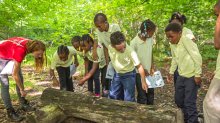

Yes, Field Trips Are Worth the Effort
Culturally enriching trips can boost grades and decrease absences and behavioral infractions, new research reveals.
As a teacher, Elena Aguilar often looked for opportunities to get her students out of the classroom and into different neighborhoods or natural environments. “We did the usual museum trips and science center stuff, but I loved the trips which pushed them into unfamiliar territory,” writes Aguilar , an instructional coach and author. Nudging kids out of their comfort zones, she says, “taught them about others as well as themselves. It helped them see the expansiveness of our world and perhaps inspired them to think about what might be available to them out there.”
Aguilar’s thinking made an impact: 15 years after traveling with her third-grade class to Yosemite National Park, a student contacted Aguilar on Facebook to thank her for the life-changing excursion. “You changed our lives with that trip,” the student wrote. “It's what made me want to be a teacher, to be able to give that same gift to other kids.”
As schools grapple with pandemic-related concerns about balancing in-seat instructional time with non-essentials like trips, new research published in The Journal of Human Resources argues that field trips, and the vital educational experiences that they provide—whether it’s a visit to a local museum or a big commitment like Aguilar’s national park trip—deliver a host of positive social and academic outcomes and are worth the effort.
“The pandemic should not keep schools from providing these essential cultural experiences forever,” asserts Jay P. Greene , one of the study’s co-authors and a senior research fellow at the Heritage Foundation, in an opinion piece for the Daily News . “If schools make culturally-enriching field trips an integral part of the education experience, all students—especially those whose parents have a harder time accessing these experiences on their own—would benefit.”
In the study, researchers assigned more than 1,000 fourth- and fifth-grade students in Atlanta to two groups. One group participated in three to six “culturally-enriching” field trips—visits to an art museum, a live theater performance, and a symphony concert—while students in the control group stayed put in class. The outcome? Kids in the field trip group “scored higher on end-of-grade exams, received higher course grades, were absent less often, and had fewer behavioral infractions,” compared to students in the control group, according to a ScienceDaily brief . Benefits lasted two to three years, Greene writes, and were “most visible when students were in middle school.”
“We are able to demonstrate that a relatively simple intervention—and we consider it pretty low-touch; three field trips in a year, maybe six field trips in two years—can actually have some substantial impacts,” says lead study author Heidi Holmes Erickson in an interview with The 74 . “They’re not just limited to social benefits. It shows that smaller interventions can actually have some significant effects on academics as well.”
Field trips aren’t a threat to in-class instruction, Erickson notes, they’re a tool to help bolster engagement and expand students’ horizons. “It's possible to expose students to a broader world and have a culturally enriching curriculum without sacrificing academic outcomes, and it may actually improve academic outcomes,” Erickson says. Far from harming test scores, the researchers found that culturally rich excursions reinforce academics and “students who participated in these field trips were doing better in class.”
Meanwhile, class trips don't need to be elaborate productions to make an impact: small excursions outside the classroom—"low-touch," as the researchers call them—can pack a punch. Here’s how three educators recommend dialing it back with low-stakes options that are both engaging and stimulating for students, but might not require days to prepare and plan:
Make Them Bite-Sized : Instead of allocating an entire day to a field trip, educational consultant Laurel Schwartz takes her classes on micro field trips , or “short outings that can be completed in a single class period.” These real-world encounters, she says, are especially beneficial for English learners and world language students. A micro field trip to a nearby park or around school grounds, for example, can be a great opportunity to “enhance a unit on nature and wildlife while reinforcing vocabulary for senses, colors, and the concepts of quantity and size,” Schwartz writes. “Afterwards, students might write descriptive stories set in the place you visited using vocabulary collected and defined together by the class.”
Try Teacher-Less Trips : To encourage exploration and learning outside of the classroom, former social studies teacher Arch Grieve removes himself from the equation with teacher-less field trips rooted in students’ local communities. Grieve only suggests options that are directly tied to a unit being discussed in class—like attending a talk at a local university or visiting a museum or cultural festival—and offers extra credit to incentivize students. “These trips allow for a greater appreciation of my subject matter than is possible in the school setting, and perhaps best of all, there's little to no planning involved.”
Explore Virtual Options : It may not be as fun as visiting in person, but the Internet makes it possible to visit museums like The National Gallery of London and The Vatican Museums without leaving the school building. Middle school English teacher Laura Bradley likes to search the Museums for Digital Learning website by topic, keyword, and grade level, to find lessons and activities that meet her unique curricular needs. The site grants access to digitized museum collections, 3D models, audio files, documents, images, and videos.

***Some of the links below are affiliate links, meaning that at no additional cost to you, I will receive a commission if you click through and make a purchase.***
Top 12 Educational School Trip Ideas for Student Success
Table of Contents:
Learning is a never-ending process. It’s not only an educational institution that teaches you! And when it comes to students, what better way than a fun and engaging field trip!?
After all, who doesn’t enjoy a great field trip? It allowed students to leave life’s routine and experience something completely different. And, when it serves the purpose of an educational trip, students can’t wait!
But planning a school trip is more than just fun and excitement! It must add value to the students learning! If you have ideas for student educational trips, this article is for you!
Here, we list the 12 best school trip ideas to help students enhance their learning journey.
We are your companions, like the best essay writing websites that help you prepare the paper by offering abundant ideas, knowledge, and understanding of your requirements.
We’ve listed the fun learning opportunities for students of all ages at different price points that teachers can have a look at. Let’s get started!
Idea 1: Local Museums
What better way than spending a day at the local museums that hold the history of the places?
It doesn’t have to be a history museum; it could be art, science, or a combination!
Museums and school trips are both fun and educational. Students get to learn about different cultures, periods, and history and gain appreciation for the work of artists and scientists.
It is also a great approach to give a sense of belonging to them about their place’s history.
Museums are also a great way to help students write a paper about it. Instead of having to reach out to a research paper writer who already holds the ideas and expertise to write the best essay, students can do the job on their own with a bit of help from them.
Idea 2: Outdoor Adventures
Often surrounded by four walls and classes, why wouldn’t students love a fun outdoor activity? Nothing gets students outdoors like an educational trip. A trip with the teacher ensures that they are aware of what to do and what not to do, but in all, they will have great fun.
An idea of the campground or state park sounds excellent. Students will get to explore nature while learning about the environment. Further, other activities include rock climbing, zip-lining, and hiking. With, outdoor adventure trips seek additional care from teachers!
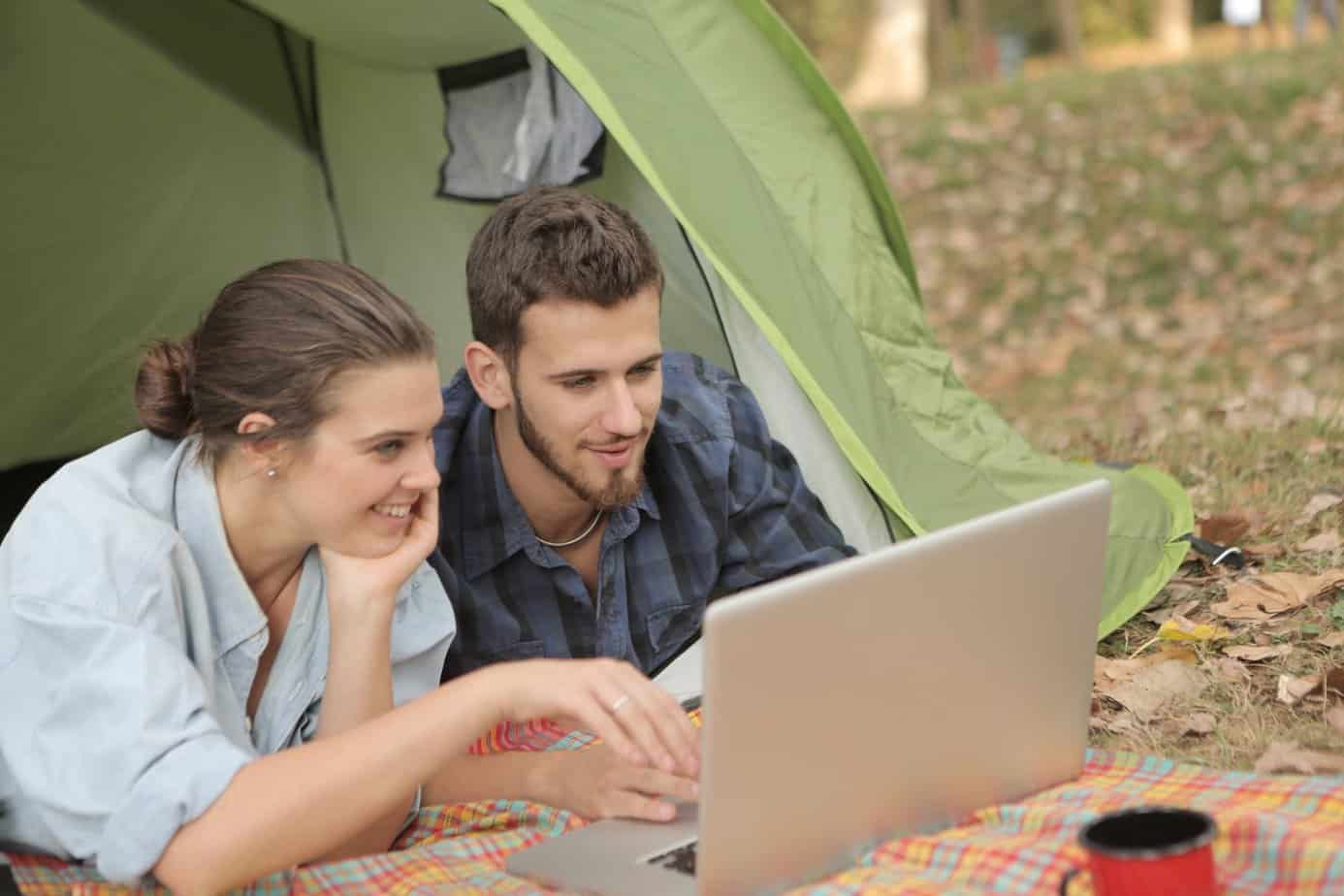
Idea 3: Cultural Destinations
When planning a school trip, consider embarking on an educational adventure at a cultural destination that speaks history and culture. It could be a historic site, a cultural center, or an archaeological site.
In such trips, students explore customs, beliefs, and cultures. Museums are also a great idea, but the cultural destination holds its value! Students can gain insight into the people’s lifestyles in other countries and the periods they lived through, and even participate in workshops to learn more about them.
Idea 4: Farm Visits
Educational trips for students , especially younger children, demand simplicity and fun learning. They barely understand the history of exploring around the museums. Here, a fun farm visit is both exciting and educational!
Farms are perfect for exploring nature closely. Such a trip with the teacher will help students learn about the importance of sustainable farm practices, healthy food choices, and animal husbandry. Plus, they’ll enjoy watching and feeding animals.
Idea 5: Aquariums and Zoos
Next on our list of school trip ideas are Aquariums and zoos. They offer many educational opportunities for students, especially the younger ones! Here, they will be able to learn about animals and their habitat.
In fact, it is a way for them to see the animals they’ve always seen on screen and paper.
In aquariums, they can uncover the ocean’s mysteries and lifestyles. Plus, it is always great to see some wildlife close!
Idea 6: Art Galleries
Art has its own way of expressing itself. It speaks differently to everyone. With art gallery trips, students can immerse themselves in art and history.
They can explore the work of famous artists, view unique art, and get a deeper understanding of cultures and traditions worldwide.
Idea 7: Theater and Dance Performance
A bit of entertainment included in the learning process does no harm. A field trip for students to theater and dance performances encourages appreciation of performing arts.
To ensure that these cultures stay extinct, the student must know what theater and dance performance is! They will be exposed to different forms of art. Further, it can be an essential lesson to them on collaboration, communication, and expression.
Idea 8: Theme Parks
The theme park is also a great field trip suggestion, depending on the subject. You can give students a thrilling educational experience at amusement or theme parks.
They can learn more about physics and engineering while riding and playing! Further, from a business perspective, they get the idea behind what it takes to run a successful business . Amusement parks are also a place to practice mathematics by calculating the cost of food and rides.
Idea 9: Industrial Sites
If your students are more into business, visiting factories and industrial sites can significantly help them.
Here, they can learn how things are made from scratch. They can learn the manufacturing process, discover the importance of safety measures, gain insight into the product, and more.
Factories can be eye-opening experiences for students to help them understand the value of hard work and effort.
Idea 10: Charity Events and Fundraisers
A learning journey towards sympathy and affection teaches a lot. When you let your students attend charity events and fundraisers, you teach them the importance of helping others.
Charity events provide great insight into how a small contribution can make a big difference. Further, charities and fundraisers can be something other than a school trip. Students can volunteer in these activities.
Idea 11: Business Tours
Business tours are a great initiative to explore the world and entrepreneurship firsthand. On such a trip, students learn about different industries and how they operate, and they even meet entrepreneurs who can share inspiring stories.
Going on a business tour and exploring a part of the world they want to become familiar with can be an invaluable experience for students.
Idea 12: International Trips
While it might be a bit costly, compared to other ideas mentioned on the list, an international trip gives the students the taste of another culture.
Here, they can explore different customs and businesses, learn about foreign languages and foreign cultures, and accept the beauty of the places. International trips are an unforgettable experience for everyone!
Wrapping Up
This summarizes our list of the top 12 best school trip ideas for students.
We have listed some of the most popular ideas, from museums and art galleries to amusement parks and international tours. Depending upon the subject, curriculum demand, and students’ wants, you can go with the trip that best suits the student.
Further, consider the age and learning perspective of the students. A school trip is a significant responsibility for teachers and must be carried out carefully to be a success. With these ideas, you can come up with the best suit!
Have you ever planned any of the school trips? What ideas did you move forward with? Do let us know!
Leave a Reply Cancel reply
Your email address will not be published. Required fields are marked *

We are Karolina, Patryk, and Mia, the lazy traveling family. After spending 5 years as digital nomads, and living in many countries in the world, we decided to make Poland our base.
Our mission is to show you safe and interesting destinations where you can travel with your family.
Join our Facebook Group
Join the Poland Travel Support Group , a group to help you plan your trip to Poland!
Subscribe and Get Updates

- Travel Blog Cooperation
- Destinations
- Privacy Policy
- Affiliate Disclosure
- Terms of Service
- Powered By:
- www.HotelMarketingBlackBook.com -
- Hotel Marketing Agency
- Cash Rewards Credit Card
- Personal Loan
- Home Mortgage
- Student Loan
- Self-Guided Planning
- Planning with a Financial Professional
- 403(b) Plans
- Traditional & Roth IRAs
- Group Term Life Insurance
- Accidental Death and Dismemberment Insurance
- Guaranteed Issue Life Insurance
- Accident and Injury Insurance
- Disability Income Protection
- Dental and Vision Insurance
- Pet Health Insurance
- Medicare Supplement Insurance
- Auto & Home Insurance
- Renters Insurance
- Discount Marketplace
- Discount Tickets
- Auto Buying
- Wireless Program
- Complimentary Life Insurance
- Student Debt Navigator Tool
- Mental Health App
- Travel Rewards
- Job Layoff Assistance
- Disaster Relief Assistance
- Family & Wellness
- Life Insurance Protection
- Living in Retirement
- Paying for College
- Personal Finance
- Retirement Learning Center
- Shopping Discounts
- Student Loan Debt
- Travel & Vacations
Get Started
Create an account to get started, or if you already have an account, sign in below
How Field Trips Boost Students’ Lifelong Success
Educational trips contribute to better student outcomes in school and beyond. maximize the impact of field trips on students with these 9 ideas..

by NEA Member Benefits
Here’s why field trips are important
The study found that regardless of gender, ethnicity or socioeconomic status, children who take school trips have better grades (59%), higher graduation rates from high school (95%) and college (63%) and greater income (12% higher annually).
In fact, 89% said educational trips had a positive, lasting impact on their education and career because enriching field trips made them more engaged, intellectually curious, and interested in and out of school.
“When I was growing up, my parents said the 3 Rs (reading, writing and arithmetic) were important,” says Roger Dow, president and CEO of the U.S. Travel Association. “But for my kids, I made ‘roaming’ the fourth R. We live in a global society, and if you don’t see outside the neighborhood you grow up in, the world will pass you by. Traveling has opened my kids’ eyes. It’s made them more confident and inspired them to reach outside their normal environment to learn and obtain skills to bring them to the next level.”
More benefits of school trips
Margy Natalie, acting onsite learning manager at the Smithsonian Institution’s National Air and Space Museum , notes the powerful effect school trips can have on student learning: “Field trips give students the opportunity to learn in a natural environment and experience things first-hand and from primary resources, rather than texts; real objects rather than photos.”
Carylann Assante, executive director for Student & Youth Travel Association (SYTA) and SYTA Youth Foundation , seconds the notion that real world exploration outside the classroom can bolster students’ critical thinking skills. “Today’s students are visual learners, and a field trip lets them touch, feel and listen to what they’re learning about, which helps them build on classroom instruction, gain a better understanding of topics, build cultural understanding and tolerance, and expose them to worlds outside their own.”
Assante says field trips are particularly important for disadvantaged students, as they provide students with unique opportunities that level the playing field. “Field trips give diverse and financially-in-need students equal opportunity to experience things outside classroom that their families may not be able to afford,” she says.
A field trip can also be the first trip a student takes without their parents, so it builds independence, as well. “There’s a reason people say I need to get away and recharge my batteries. There’s truth to it,” Dow says. “If I was a school system looking at these stats, I couldn’t afford not to make this a part of our curriculum.”
Tips for planning a successful field trip
You’ve decided to plan an educational field trip for your class, whether it’s to an art museum, science museum, historic site, aquarium, planetarium or some other immersive, interactive learning environment. Now, you need to know what steps to take to ensure a successful field trip. Keep these expert tips in mind:
1. Look around your region for interesting day trips
Dow suggests a planned field trip so you and your class can easily explore an aspect of local history on a day trip. “You can take a quick drive and see the history of places around you—there’s tons of inexpensive things teachers can do that will have a phenomenal impact,” he says.
2. Do your homework
Ideally, you could scope out the destination in advance to ensure the field trip will produce your desired learning experience. “Plan carefully, do your research, visit the site before you plan, ask questions and take recommendations of staff,” Natalie suggests.
3. Follow protocol
“Teachers need to review their school’s policies on field trips in advance and prepare the forms with specific learning objectives and how the field trip will accomplish those objectives tied to their school's core curriculum,” Assante says. Most museums, attractions and locations have education materials to explain how their attraction supports teacher lesson plans and educational curriculums.
4. Involve your students in the preparation
Prepare your class for their upcoming school field trip by getting them interested and excited about what their experience may be like. “Discuss the goals of the field trip in advance, talk about what they will see and what they should learn,” Natalie says.
Consider letting the class pick the field trip destination so they have ownership and will feel invested in it, Assante suggests.
5. Make trips relevant to classroom instruction
“Base your field trips on your content area. If you’re studying ancient Egypt, don’t take them to Jamestown,” Natalie says. “Focus on how the trip fits into your content or another educational goal. A field trip should be a day out, not a day off.”
6. Incorporate technology
“Many students use their mobile devices to engage with the field trip in the classroom with apps and blogs,” says Assante. This can help create an interactive learning experience that engages students during the trip, and then reconnect with that experience later in the classroom and at home.
7. Engage the senses
Select a field trip destination where students won’t be sitting down, like they typically do in the classroom. They should be able to touch, explore and share their experiences, Assante says.
8. Fundraise to cover any extra costs
“Engage the parents, PTA or other teachers to support school-wide field trips and help raise the funds so everyone can afford to attend the trip,” says Assante, who also notes some large companies even offer field trip grants.
If you’re looking for deals on tickets to attractions and events, see if you can cut the costs of the admissions fees with the NEA Discount Ticket Program .
9. Follow up on the lessons learned
“Students are much more likely to write about an experience they recently had, like the field trip, than a random prompt,” says Natalie, who recommends following up with graded assignments. “Have each student write about their favorite artifact or activity on the field trip, or why this field trip is important to keep, or conversely, how a different field trip might be better.”
Search for travel deals for NEA members
Nea discount tickets program.
Enjoy unique access and deep discounts to must-see places, events and shows. Get up to 40% off tickets to Disney World, Universal Studios, Cirque du Soleil, AMC Movies, Broadway shows, concerts, sporting events and much more!
NEA Travel: Car Rental
Save up to 25% when you rent a car through the NEA Travel Car Rental program. Compare rates at companies such as Avis, Budget, Enterprise and Hertz and pick the best deal for your budget.
NEA Travel: Hotels
Save up to 60% when you book through NEA Travel. And with guaranteed price matching you can rest assured that you’re getting the best hotel price.
NEA Travel: Flights
Find low fares and book a flight to your favorite locales or far-off destinations. Compare rates from multiple carriers to find the best trip for you.
NEA Travel: Cruises
You’ll find the best cruise deals, exclusive offers and amenities from the top cruise lines such as Disney, Carnival and Royal Caribbean.
You might also like

Your Pass to Fun: Get Discounts on Tickets to Popular Attractions

8 Little-Known Vacation Deals for Teachers

How to Enjoy Great Museums for Free

Finding Travel Deals Is Easy With the NEA Travel Program

Car Rental Made Quick and Easy

How to Plan a Vacation Without Going Into Debt

Easy Ways to Save Money on a Road Trip

How to Dine on a Dime While Traveling

Travel the World With Grants Just for Educators

Don’t Miss These Top Discounts for Teachers and Education Professionals

Get Easy Access to Our Most Requested Deals and Discounts

A New Way for NEA Members to Find Exclusive Shopping Discounts
Planning a School Trip: Our Step-By-Step Guide
We can probably all agree that to experience learning while out in the world has a big impact. This on-the-spot learning is one of the best ways to ensure that concepts, skills and knowledge are retained. Planning a school trip is one of the most effective ways to introduce experiential learning to your students. A school trip not only cements learning in a way that kids will still be talking about it years later, it also makes that knowledge applicable to real situations. In other words, it turns knowledge that students just have (somewhere, deep down) into knowledge they can use .
But it’s all very well and good to talk about how great school tours are, but how in the world do you actually go about planning one? Where in the world, for that matter? It can seem like an immensely overwhelming task to think about planning a school trip. You might not even know where to start. Luckily, we’re going to make it easier for you. We’ve put together a step-by-step guide to help you get your next (or first!) tour underway.
Step one – the purpose of the school trip
First, you’ll need to figure out the basics. What’s the purpose of this tour? You might already take a particular subject, sport, or activity, which makes determining the focus easy. However, it is worth considering the particular areas you would hope to reinforce or improve upon with this tour. Think about your ideal outcomes, or skills you would like students to gain from this experience. Then it’s time to think about the destination/s, time of year, and duration of the tour. A tip from us here is to be sure to check the academic calendar, assignment periods and school events. It’s definitely worth making sure there are no clashes with other activities or events relevant to students. We have had complications in the past with students dropping out of tours because it clashed with their senior ball!
Step two – choose an educational travel partner
Your next step is to select an educational travel partner. Companies like Student Horizons are here to take all the minutiae of planning a school trip off your plate. You will be able to hand over over all of the organisation, admin, bookings and other details. Right away, the tour planning process becomes so much easier and less stressful for you. Of course, it is important to work with someone you like and trust. If you haven’t used an educational tour provider before, we suggest having a checklist of requirements to help you choose. These might include: support to students, teachers and parents, educational content and resources, industry experience, and crisis management support. Over the last seven years, Student Horizons has proudly cultivated strong working relationships with over a hundred schools across New Zealand and Australia. Our experience, attention to detail, safety and risk management systems and client care has led to extremely positive feedback and a high rate of repeat business.
Step three – building your itinerary
Now that you’ve decided what type of school trip you’re planning and selected a tour provider, it’s time to start building your itinerary! You will need to know your estimated group size, and budget per student. Student Horizons’ tours are bespoke and can be entirely customised to meet your needs. It’s up to you to choose, therefore, how many fixtures, performances, workshops or coaching sessions you want to include. This is generally a good place to start, as putting the key elements in place first will help determine where additional activities can fit in. It’s also good to think about sightseeing excursions, the type of accommodation you’d prefer, and how many teachers will be travelling on the tour. We recommend a minimum of one teacher for every ten students.
Step four – get tour approval
Finally, the last step is to get tour approval! Your school will have specific policies and processes that you need to comply with before booking a tour. Student Horizons will provide all necessary documents to help you secure the support of the principal and department heads.
Planning a school trip can be a long process. We always suggest starting to think about the details we’ve outlined above at least a year in advance. However, working with the right educational travel provider can reduce all the hassle of that year-long process to a mere handful of admin tasks. We would love to show you just how much easier the planning process could be with Student Horizons on board.
To find out more about how we support you, visit our teacher support page .
The Educational Benefits of Travel
- Posted March 19, 2021
- By Gianna Cacciatore
- Entrepreneurship
- Global Education
- Informal and Out-of-School Learning
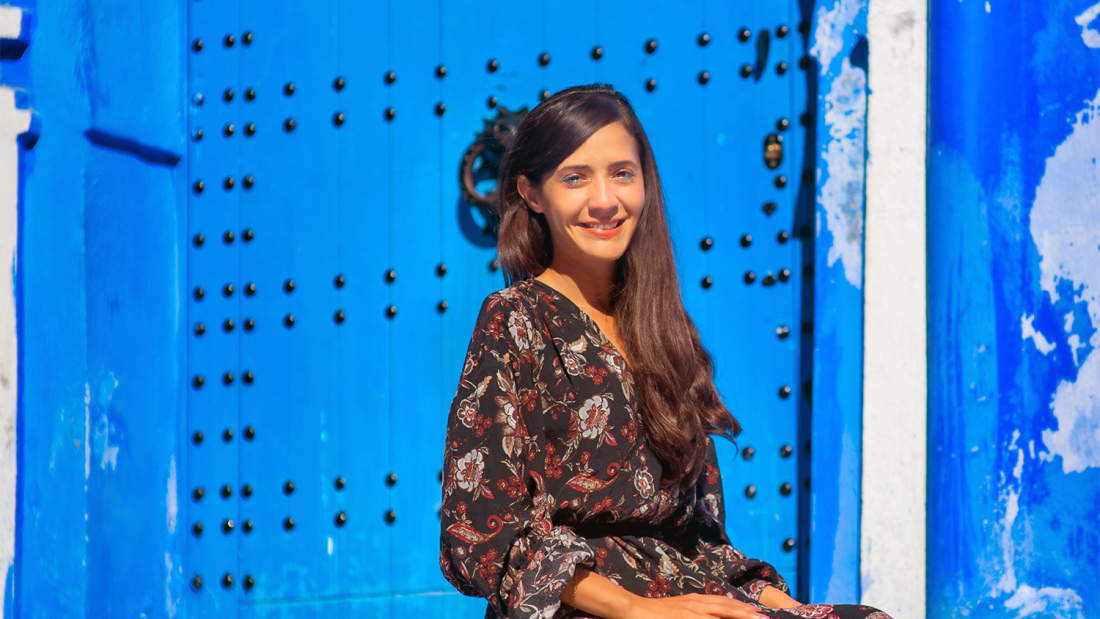
Master’s student Yasmine El Baggari has been to all 50 states. And she hasn’t just “been” to them in a casual, check-off-the-box way. She has been to them, for extended trips, staying in the homes of more than 250 families, riding countless Greyhound buses, and fostering thousands of genuine connections across cultures.
Originally from Morocco, El Baggari decided that she wanted to travel the United States by bus when she was 17, starting from Kansas where she was living while taking part in the Kennedy-Lugar Youth Exchange — a state-department exchange program that seeks to dismantle stereotypes about Morocco, Africa, and the Middle East in the United States. “I told myself, if I can break down stereotypes in Kansas, I can do it in all 50 states,’’ says El Baggari. She continued her travels across the U.S. through college and beyond, visiting her final state — Alaska — in 2019.
Her commitment to the interpersonal and cross-cultural benefits of travel only grew from there, with additional visits to 50 countries. Six years ago, El Baggari founded Voyaj , an international exchange company that seeks to break down cultural stereotypes and foster a sense of global interconnectedness through travel experiences. Voyaj connects people of all ages with others in their destination country who share their interests and values, “in order to have a deeper cultural experience through their lens,” El Baggari explains.
The program, currently being piloted with select communities, has facilitated journeys for its clients to more than 40 countries, including France, Morocco, and the United States. Hosts open their homes to travelers, who then open their hearts and minds to embrace new cultures. The Voyaj process is planned to work through the Voyaj website, where travelers will be able to sign-up, arrange homestays, and share stories about their journeys.
El Baggari’s work at Voyaj, which is currently a venture at the Harvard iLab , is grounded in the belief that when humans from different backgrounds form authentic connections, our increased global understanding can help lead to a more peaceful world. Learning more about how the human mind works while at the Ed School has given her insight into the factors at play when two strangers sit down and form a deep bond, despite their different social contexts — factors she learned anecdotally from her travel experiences. This developmental knowledge, El Baggari believes, will help her understand cross-cultural connections, even when stereotypes, walls, and borders stand in the way.
“It is so important to realize that we aren’t really that different, and that we can embrace any perceived or real differences and identify our commonalities,” she explains.
When COVID-19 restricted travel, Voyaj created remote opportunities for connection, facilitating online experiences for people around the globe. While these gatherings lack the allure of an international, in-person experience, they have addressed some of the social ills exacerbated by the pandemic like loneliness and isolation. “That’s one of the positive sides of COVID: More communities are looking to connect and to do so more deeply,” says El Baggari. “Because of the isolation, people are eager to meet. These virtual experiences have proven meaningful.”
El Baggari expects the evolution of Voyaj to continue — even as she concurrently focuses on her ultimate travel goal: becoming an astronaut through Space For Humanity’s sponsored citizen astronaut mission. With the support of her global team, she is running pilots for the upcoming Voyaj app, as well working to form partnerships with other exchange and travel organizations in the United States, New Zealand, Morocco, and elsewhere.
El Baggari believes that travel is about more than place. It is about people: the people you see, the people you meet, and the people who change you along the way. “I believe we have the opportunity to learn at every moment from every encounter,” says El Baggari. “We’re here, and alive! We’ve got to connect, to open and share our cultures, and realize who we truly are.”

The latest research, perspectives, and highlights from the Harvard Graduate School of Education
Related Articles
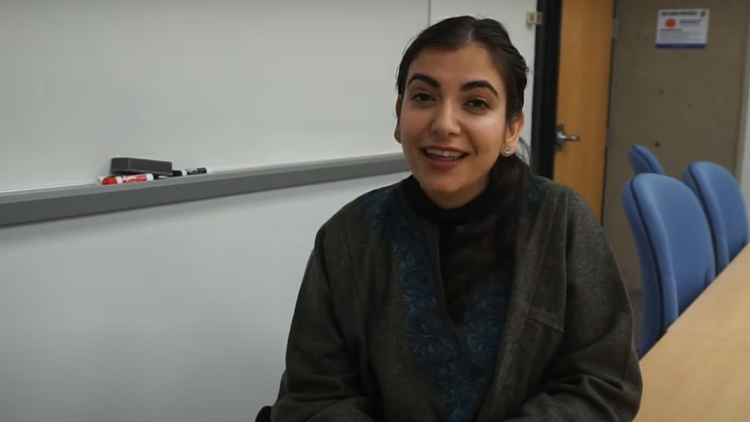
Every Child Has a Voice
Building social-emotional learning skills through the arts
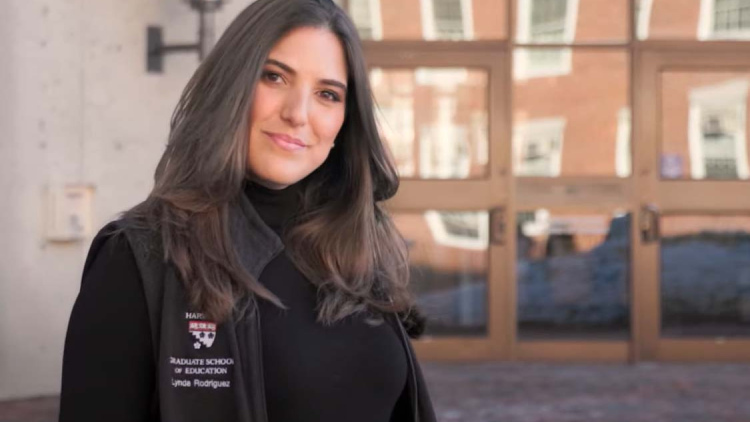
Beyond Table Manners
Lynda Rodríguez, Ed.M.'22, shares how etiquette can be a powerful learning tool
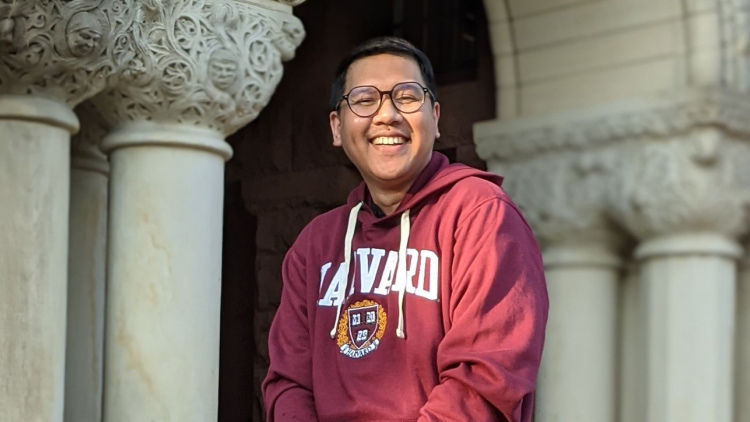
A Personalized Learning App Helps Close the Divide
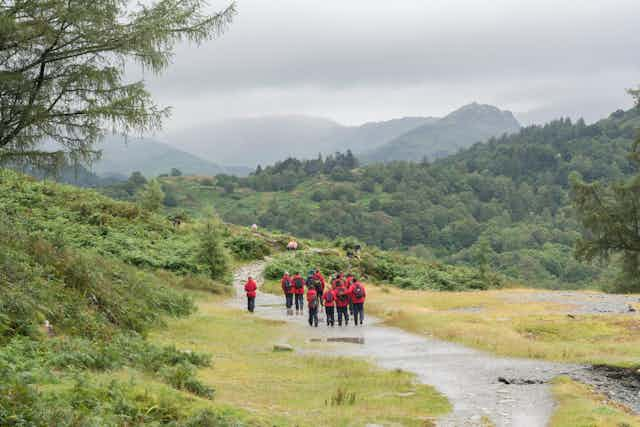
How COVID-19 has affected overnight school trips, and why this matters
Lecturer in Business Management, University of Winchester
Disclosure statement
Karen Cripps does not work for, consult, own shares in or receive funding from any company or organisation that would benefit from this article, and has disclosed no relevant affiliations beyond their academic appointment.
University of Winchester provides funding as a member of The Conversation UK.
View all partners
For over 45 years, children from across the UK have headed to the family-run Rhos-Y-Gwaliau Outdoor Education Centre in Snowdonia, north Wales on school trips. They’ve gone gorge walking and abseiling. They’ve explored mines.
Rhos-Y-Gwaliau has been seen as a haven of outdoor learning for children who otherwise might not have access to the countryside – not to mention the awe and wonder of the Welsh peaks. That is, until the pandemic hit.
For the first time in over a year, schools may once again (from May 17) organise overnight educational visits. But the damage is done. The Save Outdoor Education Campaign estimates that 2 million children nationwide have missed out on trips since residential centres were forced to close.
If the economic loss for the industry has been catastrophic ( permanent closures , 15,000 jobs cut and £500m in lost revenue ), the losses for the children are even greater.
Outdoor adventures
Sleeping, eating and sharing challenges collectively, in nature, is a valuable experience. In the context of the rise in indoor culture , there is clear support at government level for outdoor education.
Ofsted has supported the idea since 2008. The new GCSE qualification in Natural History emphasises its importance. And Natural England , the government’s advisory body for the natural environment, advocates for support to enable it.
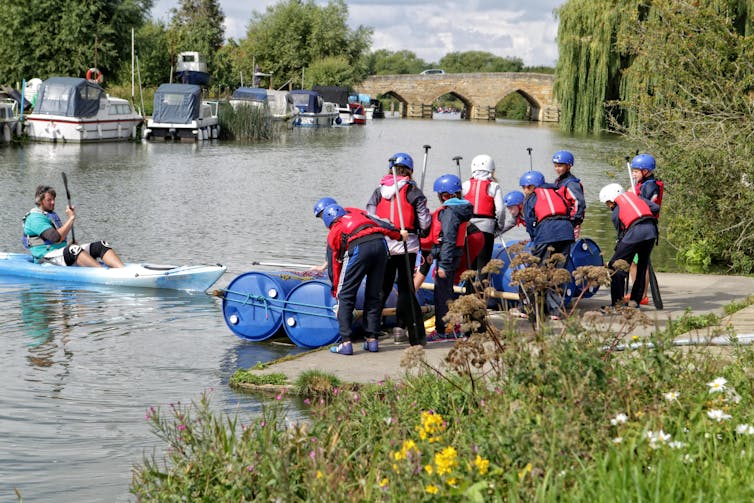
In primary school, trips are designed as adventures, with environmental discovery at the heart of the experience. Across the UK there are large activity centres equipped with abseiling towers and assault courses. In Berkshire children might go camping at the local Gordon Brown Centre , where they’ll do wall-climbing, archery and pond dipping. For schools near a river, or the coast, teachers might opt for water-based activities, such as kayaking.
In year six, trips are seen as a means to help children transition from primary to secondary school . Staying away from home – possibly the first time – and facing emotional and physical challenges through team-building activities, they are said to gain a great deal in terms of personal development.
At secondary school level, adventure programmes on trips are often enriched by discrete environmental education sessions, designed to complement the geography and science curriculum.
Personal development
Quite how outdoor education affects children’s development needs more research, but a paper looking at UK primary school children’s residential learning suggests that there are cognitive (academic) and affective (emotional and behavioural) benefits.
While the evidence for affective learning is strongest , it is clear that any emotional and behavioural benefits gained from school trips can help to lay a good foundation for academic achievement too.
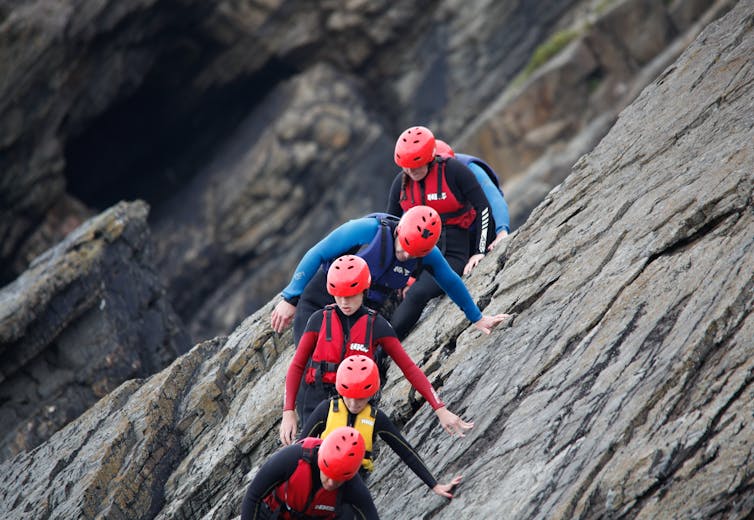
Research has found that school trips give children tools to face unanticipated challenges. They help pupils to mature, to form stronger bonds with peers and teachers, and become better students – all of which is vital for making the transition to secondary school .
Social effect
Beyond a child’s development, school trips bring social benefits too. A few days away together in a natural setting can be a great leveller. Classroom cliques and pressures dissipate when children – regardless of background or ability – have to work together to climb a mountain without a path or navigate the way through a gorge.
However, state funding to make this happen is crucial. The Institute for Outdoor Learning (a professional membership institute which champions learning in the outdoors) estimates that for the 1.4 million children who receive free school meals , going on a school trip might be the only opportunity they have to experience time away from home.
In its 2019 review on Natural Landscapes, the UK government highlighted how important it is that the British countryside remain accessible to everyone, including children from disadvantaged ethnic groups and low socio-economic backgrounds. This is all the more pressing during a pandemic which has heightened concerns around inequality of access to natural, green spaces .
Despite the many demands on how school funds should be allocated and the commitment from staff that organising school trips requires, not to mention the decline in council-funded outdoor residential centres, demand for trips from schools continues to rise . Teacher support for such trips at a time of immense pressure on education speaks volumes.
Finally, outdoor experiences can also help to foster an emotional bond with nature and shape pro-environmental attitudes. Through residential school trips, UK pupils can discover areas they might not otherwise visit, and might perhaps, come to love and thereby wish to conserve and protect.
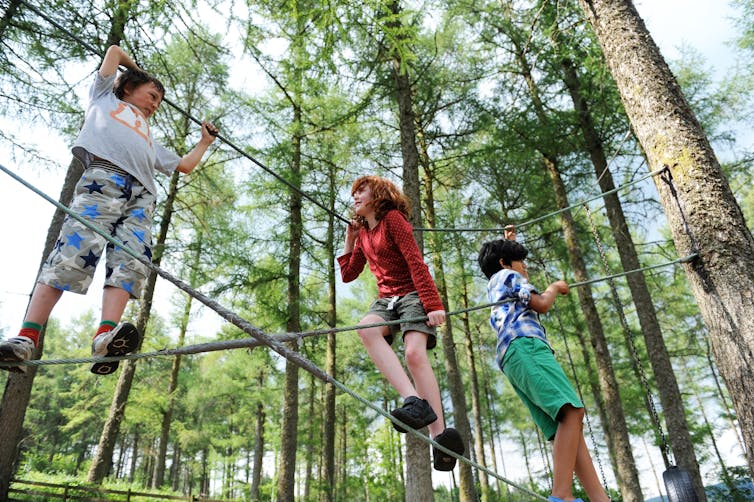
In 1978, American lepidopterist and ecologist Robert Pyle coined the term extinction of experience to capture the global phenomenon of a progressive loss of interactions with nature. It is a concept that applies to the closure of Rhos-Y-Gwaliau and other centres, and the resulting lack of opportunity for children to spend time there.
When leading British naturalist David Attenborough said , “No one will protect what they don’t care about; and no one will care about what they have never experienced,” he voiced the concerns of many conservationists. Children are the future custodians of our planet and society. Ensuring that they have the chance to access to nature – and enabling that through school trips – is something we must prioritise.
- Environment
- Education UK
- Outdoor learning
- Forest school
- Active outdoor play

Faculty of Law - Academic Appointment Opportunities

Operations Manager

Senior Education Technologist

Audience Development Coordinator (fixed-term maternity cover)

Lecturer (Hindi-Urdu)
- Grades 6-12
- School Leaders
FREE Poetry Worksheet Bundle! Perfect for National Poetry Month.
260+ Field Trip Ideas for Grades Pre-K Through 12 (In-Person and Virtual)
Get out of the classroom and explore the world!
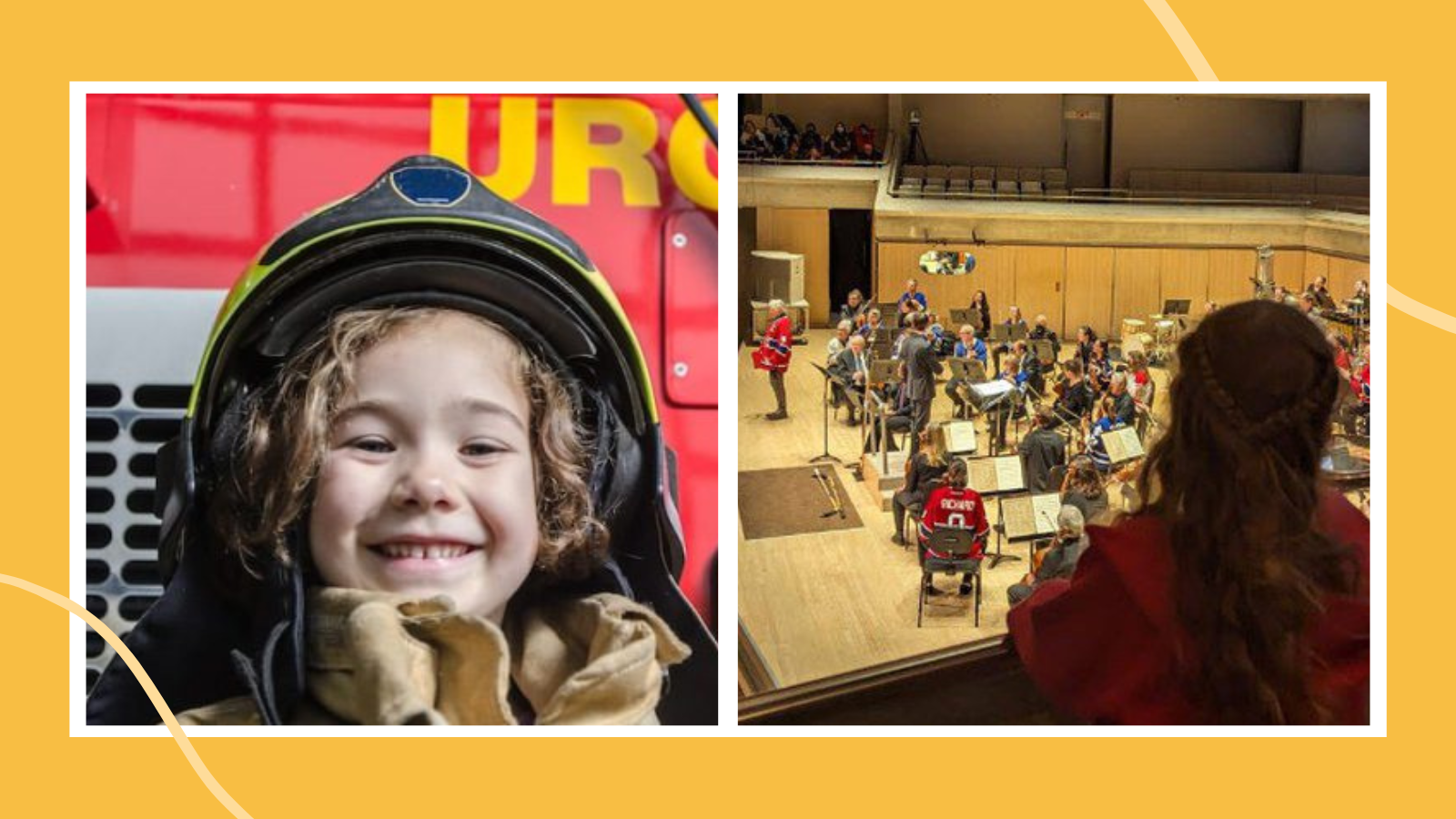
Field trips are a quintessential school experience. You usually only get one or two a year so it’s important to do it right! Our roundups of unique field trip ideas have something for every age, subject, and interest. We’ve even got resources like permission slip forms and chaperone tips. Get ready to leave the classroom behind to take learning on the road!
Preschool Field Trip Ideas
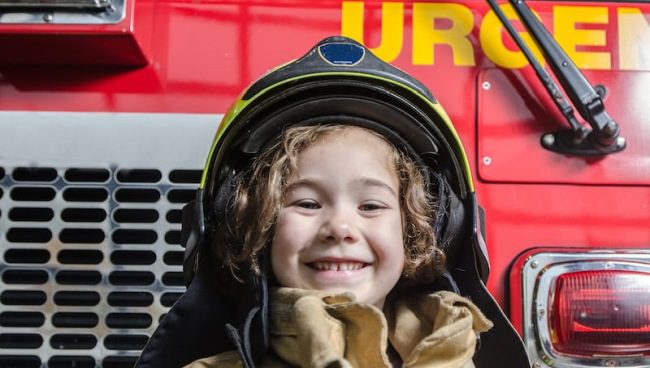
Early-grade field trips help kids learn about the world and also teach them good field trip behavior. These are our top picks for the pre-K crowd, but many of the options on our kindergarten list are perfect for this age group too.
- Library: Not every student’s parents take them to story time. Schedule your own trip, and show kids that having fun isn’t hard when you have a library card!
- Farm: Whether you learn how vegetables are grown or where milk and eggs come from, the farm is always a hit.
- Grocery store: Go behind the scenes at the supermarket, and use this trip as the foundation for lessons on healthy eating.
- Park: From local playgrounds to majestic national parks, it’s always worth getting kids into the great outdoors.
- Children’s museum: This is the age group most children’s museums were designed for! They’ll love all the hands-on fun and excitement.
- Post office: Learn how mail is sorted and shipped, and teach students about stamps and other mail-related items.
- Bank: Money is a new concept for these kiddos, and they’ll be fascinated to step inside the vault and learn other bank secrets.
- Fire station: There’s just something about a fire truck that gets every little one excited.
- Nursing home: Is there anything sweeter than watching seniors and wee ones spend time together?
- Animal shelter: For kids who don’t have pets at home, this can be a good introduction to animals. Others will just enjoy the time with dogs and cats waiting for their forever homes.
Elementary School Field Trip Ideas
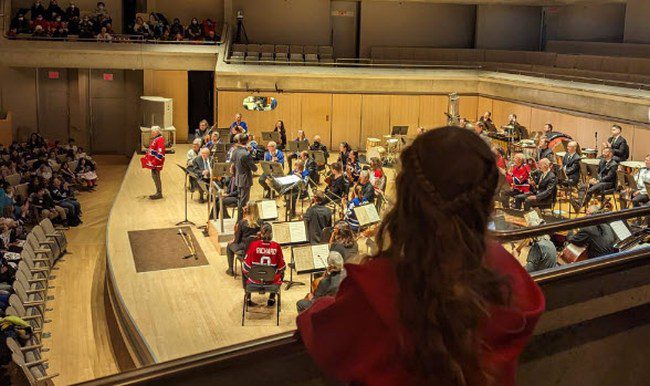
@mjdstoronto
These are the prime field trip years! Here are our favorite trips for every grade.
- 14 Kindergarten Field Trips (Virtual and In-Person)
- 15 First Grade Field Trips (Virtual and In-Person)
- 15 Second Grade Field Trips (Virtual and In-Person)
- 15 Third Grade Field Trips (Virtual and In-Person)
- 23 Fourth Grade Field Trips (Virtual and In-Person)
- 22 Fifth Grade Field Trips (Virtual and In-Person)
Middle and High School Field Trip Ideas
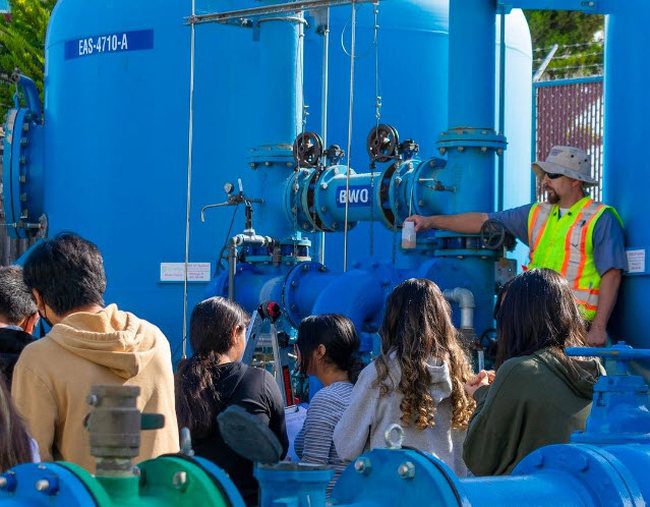
@salinasvalleybasingsa
For this age group, you’ll need to step up your game a bit. (They’ve probably already been to the zoo, the aquarium, and the art museum.) Try some of these locations, which offer educational, social-emotional, and real-life learning opportunities.
- Food bank: Hold a food drive, then arrange a trip to your local soup kitchen or food pantry. Volunteering makes for truly meaningful field trips.
- Recycling facility: In a time when reducing landfill waste is more important than ever, a trip to a recycling facility can help drive home the message.
- Theater: Many theaters offer behind-the-scenes tours for schools and discount pricing when you buy tickets in bulk. (Want to go virtual? Check out the Hamilton Education Program !)
- Community college: Parents sometimes take kids on college visits, but a community college trip offers opportunities for even more students to see themselves getting a higher education.
- TV station: Kids interested in communications or technology will find this completely fascinating.
- Courtroom: There’s no better way to understand the justice system than to see it in action.
- State or county capitol: Every government class should visit a local capitol to meet with officials and see how the government works.
- Local business: This can be a cool way to learn about managing a business, working with customers, or discovering how products are made.
- Wildlife rehab facility: Introduce students to the people who help injured wild animals recover and live free once again.
Virtual Field Trip Ideas
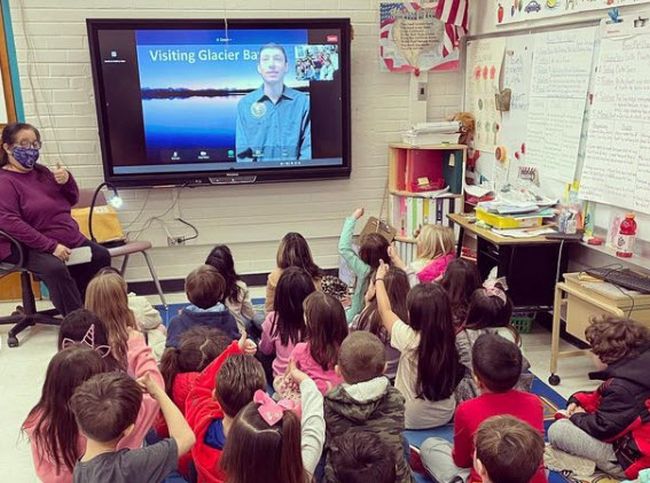
@edtech_tusd
The terrific thing about virtual field trips is that they eliminate so much of the hassle. No need to collect permission slips, arrange for buses, or recruit chaperones. Plus, they’re usually free!
- 40 Amazing Educational Virtual Field Trips
- 20 Terrific Virtual Art Museum Field Trips
- 18 Incredible Virtual Zoo Field Trips
- 15 Fascinating Aquarium Virtual Field Trips
- 3 Science Virtual Field Trips Let Kids Travel the World
Field Trips by Location
If you live in one of these cities, check out some of our favorite spots.
- 16 Cool Field Trips in Houston, Texas
- 21 Terrific Field Trips in Chicago, Illinois
- Top 10 Washington D.C. Field Trip Ideas
Field Trip Tips and Resources
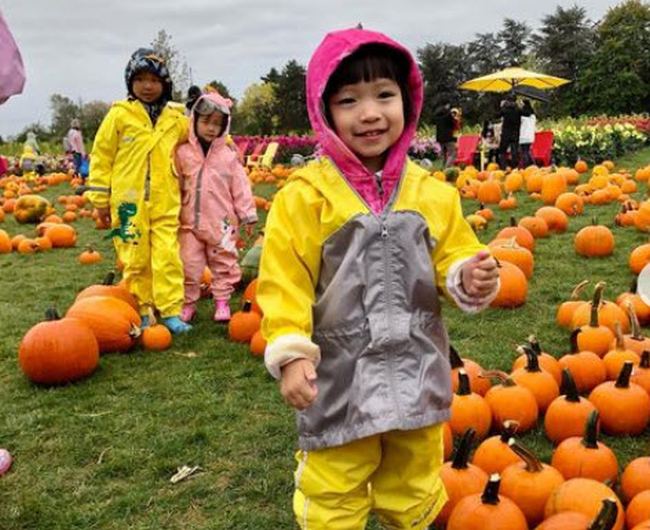
There’s a lot to do when you’re organizing an off-site field trip. These resources are here to help.
- Preparing Parent Chaperones for a Field Trip
- Free Printable Field Trip and School Permission Forms To Make Your Life Easier
- Things To Do Before Taking Your Students on a Major Field Trip
- Mistakes To Avoid When Planning a Field Trip for Students
- Why I Hate Field Trips (And How I Learned To Deal)
- Help! Is There Any Way I Can Get Out of Our End of the Year Field Trip?
Bonus: Looking for a laugh? Check out Ways School Field Trips Are Like The Wizard of Oz !
What are your favorite field trip ideas? Come share your thoughts in the We Are Teachers HELPLINE group on Facebook !
Plus, virtual college campus tours to explore from home ..
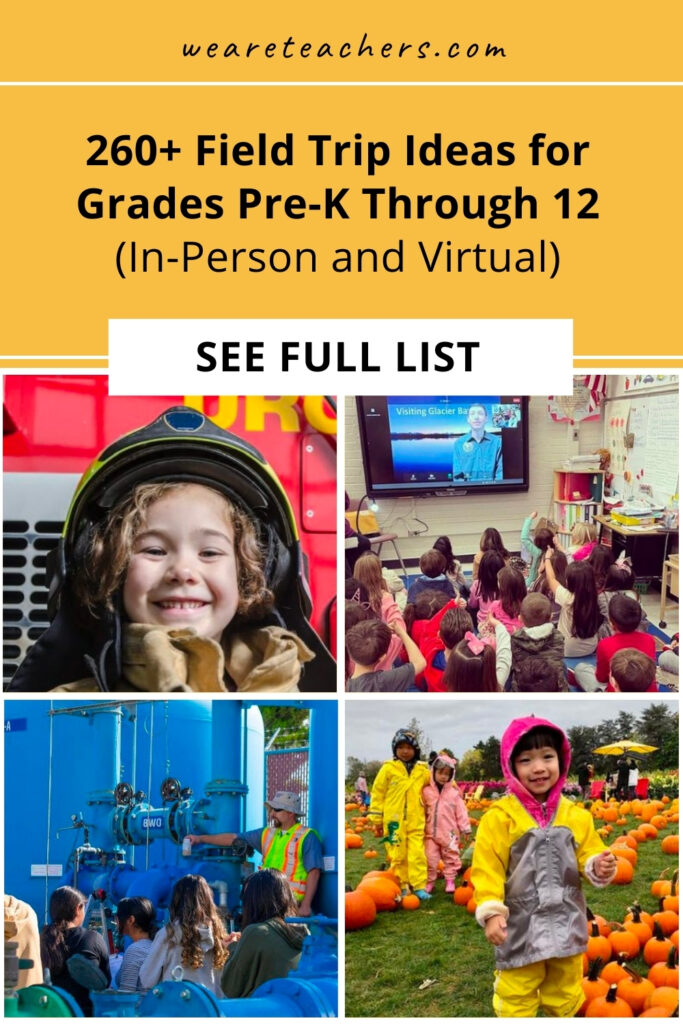
You Might Also Like
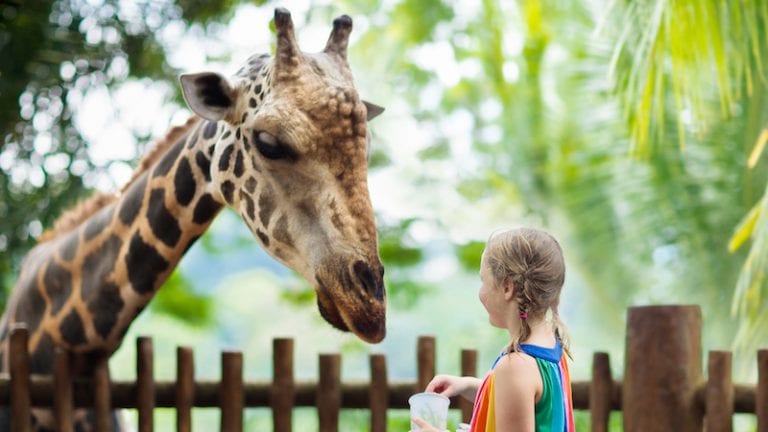
The Best In-Person and Virtual First Grade Field Trips
Field trip fun with firsties! Continue Reading
Copyright © 2023. All rights reserved. 5335 Gate Parkway, Jacksonville, FL 32256

Top 20 School Trip Ideas
Written by Dan
Last updated February 13, 2024
Teaching can be a gratifying job, and it’s even more fun when you get the chance to take your students on a school trip. Trips are a great way to connect with your students while they learn something new outside the classroom—something that will stay with them for years to come.
But as any teacher knows, planning a successful school trip can be challenging in terms of organizing transport and activities and finding one that fits your budget.
That’s why we’ve put together this list of top 20 school trip ideas, which are full of fun learning opportunities for all ages at different price points so teachers everywhere can take their classes on an unforgettable educational journey!
Related : For more, check out our article on Top 20 Assembly Ideas here.
Table of Contents
School Trip Idea 1: Local Museums.
A day spent exploring a local history museum, art museum, science centre, or planetarium can be both educational and fun. Students can learn about different cultures and periods, as well as gain an appreciation for the work of artists and scientists past and present.
School Trip Idea 2: Outdoor Adventures.
Nothing gets students outdoors like a school trip to a campground or state park. Kids can explore nature while learning about the environment, and they’ll get to try new activities like canoeing, rock climbing, zip-lining and more!
School Trip Idea 3: Cultural Destinations.
Embark on an educational adventure at a cultural destination such as a historic site, a cultural centre, or an archaeological site. Students can explore the customs and beliefs of different cultures, gain insights into people’s lifestyles in other countries and periods, or even participate in interactive workshops to learn about various topics.
School Trip Idea 4: Farm Visits.
One for younger kids! Farms offer the perfect opportunity to explore nature up close and personal. On a farm trip, students will learn about the importance of sustainable farming practices, animal husbandry, and healthy food choices. Plus, they can have plenty of fun collecting eggs or feeding animals!
School Trip Idea 5: Aquariums & Zoos.
Aquariums and zoos offer a wealth of educational opportunities for students. Kids can learn about animals in their natural habitats and uncover the ocean’s mysteries and inhabitants. Plus, it’s always a treat to see some incredible wildlife up close!
School Trip Idea 6: Art Galleries & Historic Sites.
Immerse yourself in art and history by visiting an art gallery or historic site. Here, students can explore the works of famous artists, view unique artefacts from centuries past, and gain a greater understanding of different cultures and traditions worldwide.
School Trip Idea 7: Theater & Dance Performances.
Encourage appreciation of the performing arts by taking your students to a theatre or dance performance. Not only will they be exposed to different forms of art, but they’ll also pick up on important lessons about collaboration, communication, and expression.
School Trip Idea 8: Amusement & Theme Parks.
Give your students a thrilling educational experience at an amusement or theme park. Here they can learn about physics and engineering while riding rollercoasters, find out what it takes to run a successful business by exploring different attractions and practice mathematics by figuring out the cost of rides and food.
School Trip Idea 9: Sports & Recreation Facilities.
Take your students to the sports facility for a day of physical activities. Not only can they get some exercise, but they’ll also learn about teamwork, competition and fair play. Plus, it’s an excellent opportunity for kids to develop skills like problem-solving and coordination.
School Trip Idea 10: Factories & Industrial Sites.
Bring your students to a factory or industrial site and watch how things are made. Here they’ll learn about the manufacturing process, discover the importance of safety measures, and gain insights into the production of everyday items.
It’s an eye-opening experience that can help them understand the value of hard work and effort.
School Trip Idea 11: STEM Centers.
A trip to a STEM centre is an excellent opportunity for students to explore science, technology, engineering and mathematics in a hands-on environment. Kids can participate in interactive workshops, build robots or learn about coding—all while having fun!
School Trip Idea 12: National Parks.
Give your students a chance to experience nature in all its glory at a national park. Here, they can observe the wildlife, explore different ecosystems and gain insights into conservation efforts. Plus, there are usually plenty of activities for them to try, like camping, hiking and canoeing.
School Trip Idea 13: Local Rivers and Streams.
To help kids understand the importance of conservation, take them on a trip to a nearby river or stream. Once there, they can collect data about water quality and identify different species of fish and plants. Plus, it’s always fun fishing or playing water games!
School Trip Idea 14: Transport Museums.
Give your students a fascinating glimpse into transportation by taking them to a transport museum. Here they can learn about the history of different modes of transport, explore how vehicles are made and operated, and gain insights into the science behind motion and energy.
School Trip Idea 15: Planetariums & Observatories.
Take your students to a planetarium and observatory for an unforgettable experience. Here they can learn about the stars, planets and galaxies, as well as fascinating facts about solar systems and astrology. Plus, they’ll have a chance to use telescopes and gaze up at the night sky!
School Trip Idea 16: World War Historical Sites.
To help your students understand the impact of World War II, take them to a nearby historical site. Here they can learn about important battles and key figures from that era, better understand different political ideologies and gain insights into how wars are fought and won.
School Trip Idea 17: International Trips.
Take your students on an international trip and give them a taste of another culture. Here they can explore different customs, sample exotic cuisines, learn about foreign languages and appreciate the beauty of other countries. It’s sure to be an unforgettable experience for everyone!
School Trip Idea 18: Profesional Sports Games.
Bring your students to a professional sports game and give them a chance to cheer for their favourite teams. Not only can they learn about the game’s rules, but they’ll also experience the energy and excitement of watching live sporting events. It’s sure to be an unforgettable experience!
School Trip Idea 19: Charity Events & Fundraisers.
Let your students give back by taking them to a charity event or fundraiser. Here they’ll learn the importance of helping others and gain insights into how even small contributions can make a big difference.
Plus, it’s an excellent opportunity for kids to develop teamwork, competition and public speaking skills.
School Trip Idea 20: Business Tours.
Take your students on a business tour and let them explore the world of entrepreneurship first-hand. Here they can learn about different industries, gain insights into how businesses are run and even meet entrepreneurs who can share their inspiring stories. It’sIt’se to be an invaluable experience for all!
School trips are an excellent way to help students develop essential skills and gain fresh perspectives. From national parks and observatories to charity events and business tours, plenty of exciting options can create an educational and unforgettable experience.
With careful planning and consideration, you can make a successful school trip that will benefit your students in many ways.
So what are you waiting for? Start planning your next school trip today!
Related Posts

About The Author
I'm Dan Higgins, one of the faces behind The Teaching Couple. With 15 years in the education sector and a decade as a teacher, I've witnessed the highs and lows of school life. Over the years, my passion for supporting fellow teachers and making school more bearable has grown. The Teaching Couple is my platform to share strategies, tips, and insights from my journey. Together, we can shape a better school experience for all.

Join our email list to receive the latest updates.
Add your form here
Why Are School Trips Important?
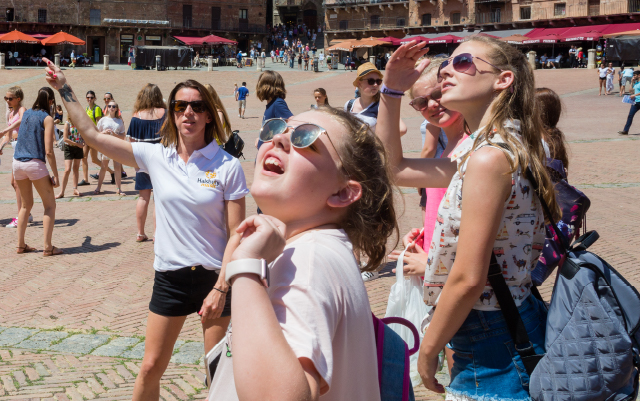
Students recognise this benefit of school trips themselves – according to the Evaluation of Learning Away Final Report, 2015 , “the views of secondary students continued to be positive in the post residential context with two thirds or more thinking that…they: would make better progress in their subject (72%); had a better understanding of the subject (72%); were better at problem-solving (66%); and would do better in their exams/tests (66%)”.
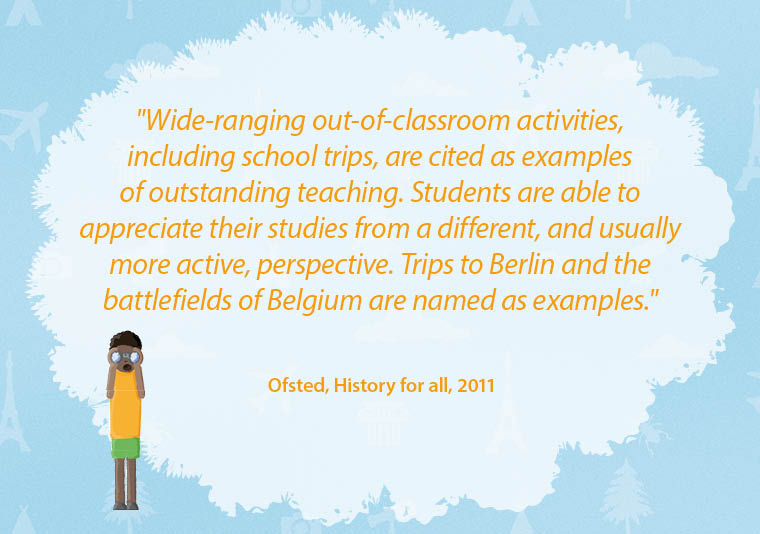
And Ofsted, in their History for All report, 2011 , said that “Wide-ranging out-of-classroom activities, including school trips, are cited as examples of outstanding teaching. Students are able to appreciate their studies from a different, and usually more active perspective. Trips to Berlin and the battlefields of Belgium are named as examples.”
Offering real-world experience of the subject
The academic benefits of school trips are pretty obvious – but important to remember.
But there’s so much more that school trips can offer students during these formative years.
For example, they give your students experience of the importance of your subject in the ‘real world’.
So? Well, pretty much every teacher has at some time or other faced resistance from kids who don’t understand why they have to learn about algebra, longshore drift or the difference between the French perfect, pluperfect and imperfect tenses. Your school trip is your golden opportunity to show them.
You may ignite a new passion. For some, you may even give them ideas for future careers they never would have considered before.
Improving the classroom environment
As you know, taking students out of the classroom can do wonders for the relationships between students and teachers, making the classroom a much nicer place for everyone to be.
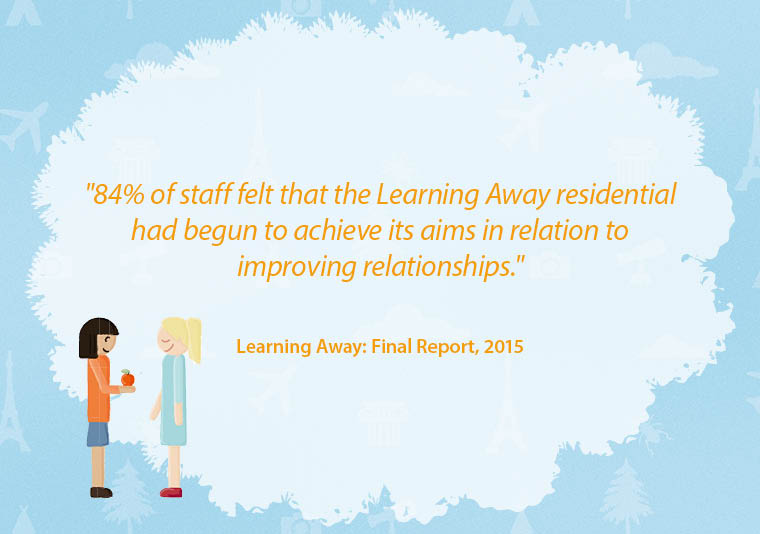
According to the Evaluation of Learning Away Final Report, 2015, “84% of staff felt that the Learning Away residential had begun to achieve its aims in relation to improving relationships” and “71% of secondary students felt that, as a result of the residential, their teachers had a better understanding of how they liked to learn best”.
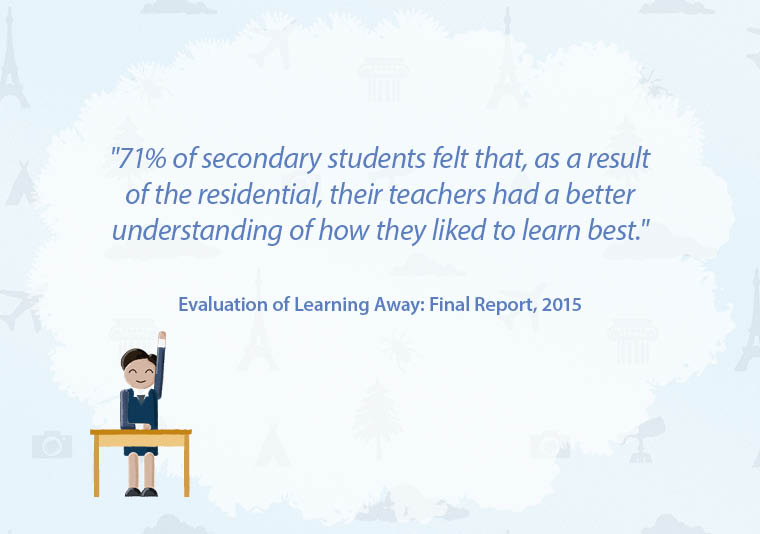
Your shared experiences and the opportunity to have fun together will improve your student-teacher relationship. And this improves behaviour and engagement back in the classroom.
It can also make it easier for students to talk to you if they need to.
Of course, students will also have the opportunity to get to know their peers better, particularly those outside of their usual friendship circles. And this can help them all to feel more comfortable in class.
More comfortable students means higher engagement and better learning for everyone.
Building confidence and developing independence
This is another often ignored but hugely important benefit of school trips.
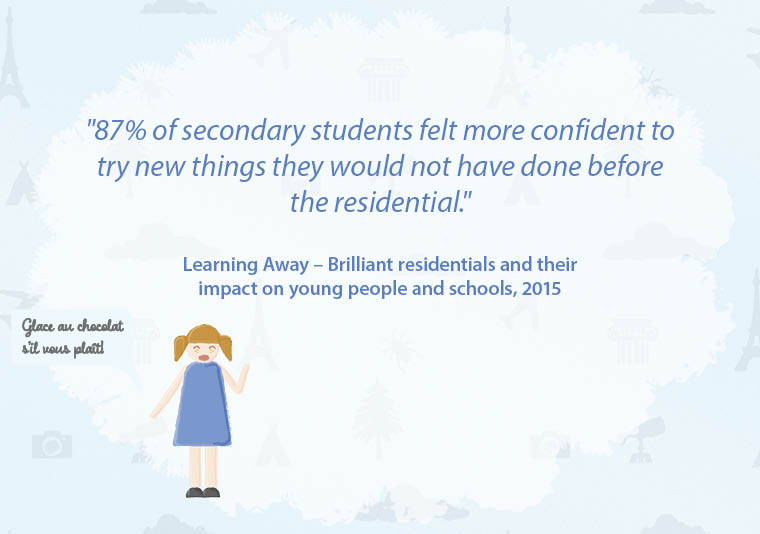
According to the Learning Away – Brilliant residentials and their impact on young people and schools, 2015 study, 87% of secondary students felt more confident to try new things they would not have done before their trip.
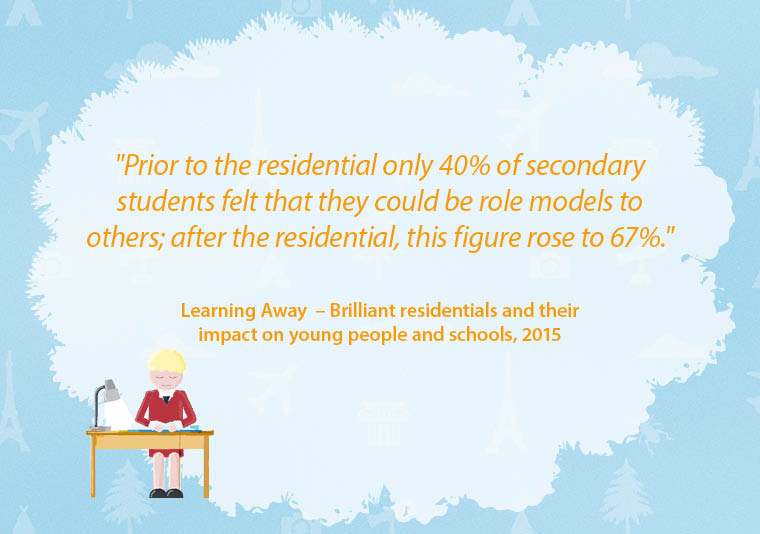
The study also found that “prior to the residential only 40% of secondary students felt that they could be role models to others; after the residential, this figure rose to 67%”.
What a gift to give your students! The confidence to try new things and broaden their horizons will open up so many incredible opportunities for them.
And for many of them, your school trip might well be their first time travelling abroad without their families.
Although they'll be fully supported by staff on the trip, they’ll still have to take responsibility for themselves.
They’ll have to make sure they’re up and ready on time every day. They’ll have to look after their own stuff and behave sensibly so that they (and everyone around them) are safe.
So, your school trip won’t just be of educational benefit from an academic point of view, it will also help your students grow up and help them on their way to becoming independent, confident young adults.
Inspiring young people
At the end of the day, aren’t school trips really so important because they’re powerful, life-changing experiences that inspire young people?
They’ll be inspired to do the best they can in their exams, by drawing on real, practical experiences and memories.
They’ll be inspired to see the value of your subject in the ‘real world’ - helping them to unlock new passions or even a future career.
They’ll be inspired to develop crucial life skills, such as independence, intercultural understanding and tolerance.
And they’ll become more confident in themselves and in their interactions with other people and the world around them.
And by running your school trip, you’ll be the teacher that provides them with all of this.
Download the FREE presentation
We’ve created this FREE, editable PowerPoint presentation with all of these points. We hope this saves you time and helps you to make the case for your next school trip.
What's next?
If you’re ready to start planning your school trip, then take a look at our ultimate guide to organising a school trip – there are loads of tips, tricks and free downloads to help save you time.
Already booked your trip and ready to crack on with launching your trip? Then you’ll want to take a look at our Trip Launch Pack .
The Halsbury Difference
School trips designed by teachers for teachers.
Originally founded by teachers in 1986 and with several former teachers in our team, we understand the pressures on you as Group Leader and work hard to relieve them.
Trips tailored to your curriculum and learning objectives
We’ll design your trip around your specific learning objectives and curriculum, to ensure it meets your particular requirements.
Rewarding loyalty scheme
Work together with other teachers in your school to save thousands of pounds on future school trips with our multi-trip loyalty scheme!
- Tour Search
Benefits of school trips, why are they important?
Educational tours and school trips abroad can help students develop both on an academic and personal level. Today we share our thoughts on the main benefits of school trips abroad for your students and children:
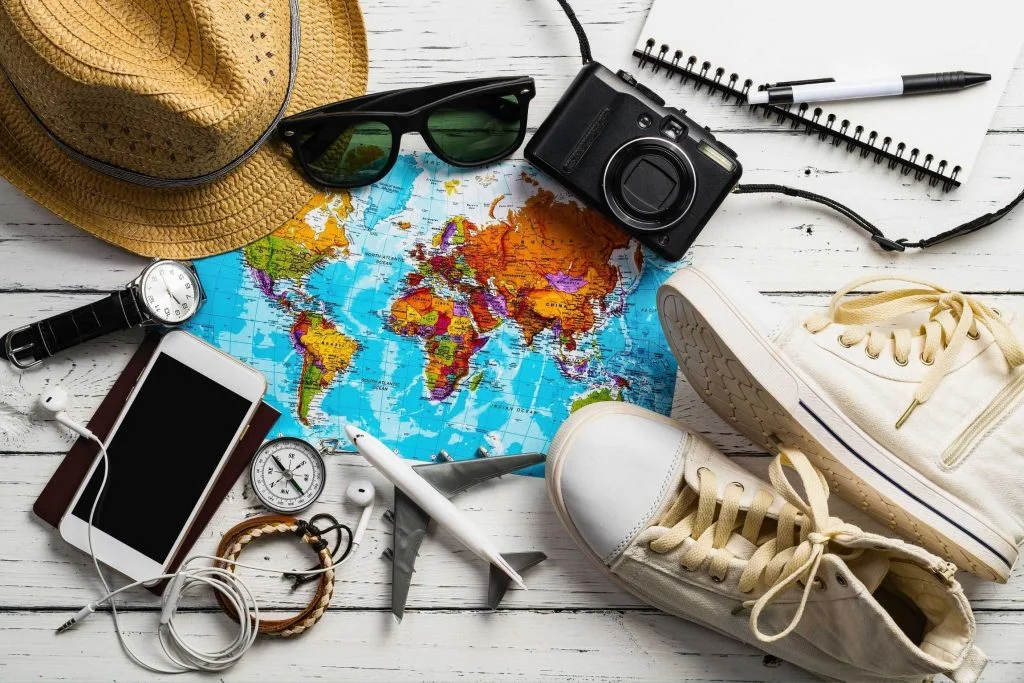
1-Reinforcing lessons and expanding knowledge
As Confucius said: “I hear and I forget. I see and I remember. I do and I understand.”
‘Doing’, or putting into action or practice lessons learnt in the classroom, helps students remember and understand them better.
Applying practice to the theory not only reinforces those lessons but expands their knowledge on the subject, giving it a different more tangible dimension.
This is applicable to all subjects, from history to art but it is particularly evident when studying languages. The excitement of using those language skills in the real world will help students see the real purpose of learning them in the first place.
2-Encouraging and discovering new interests
As humans and students our brain gets excited by different things, topics and teaching methods. School trips can be a powerful motivation tool, encouraging further learning on a particular subject or sparking their interest in new ones.
School trips abroad and indeed local school tours can inspire students. Kids who might not be particularly interested in team sports for instance, might discover they enjoy skiing, hiking or even find a new sporting passion.
3-Experiencing different cultures
Education is not only about growing intellectually or achieving results but also preparing youngsters to be responsible citizens. Experiencing different cultures teaches them valuable lessons they will carry with them into adulthood.
On school trips abroad, they get exposed to different cultures, traditions, food, languages and ways to see the world; encouraging understanding, appreciation for other nationalities and diversity. This is without a doubt one of the most important benefits of school trips abroad for all students.
4-Bonding with classmates and teachers
School trips also have an important social aspect, as they facilitate team building and bonding between classmates. Often new friendships are developed during school trips, as students from different groups might interact and mix.
They can also give teachers an opportunity to know their students better, their interests and personalities, in a more informal context and relaxed environment; and gain their trust.
5-Personal development and confidence building
Many students get their first taste of relative freedom or independence during school trips. This is an important rite of passage and has a positive impact on their personal development, building their confidence as they are taken out of their home environment and comfort zone.
For instance they will learn to manage their own time and find their way around a new city, if the trip includes free time to explore; they will be in charge of their personal budget for the duration of the trip and they can even be encouraged to organise a saving plan at home to take responsibility for their own school trip costs.
These valuable learning experiences can’t be recreated in a classroom environment or learned from textbooks.
6- Positive memories
Many of us remember our favourite school tour, whether it was a visit to a local museum or our first time saying a few words in a different language abroad. Many of our best school memories are created during school trips with peers.
As teachers and parents have told our travel team over the years, some of the benefits of school trips will last a lifetime.
Find some ideas for your school trips on our page: TOP 10 DESTINATIONS FOR SCHOOL TRIPS
We hope you enjoyed our article on the main benefits of school trips abroad, for destination ideas and travel advice for your school group, contact our knowledgeable travel experts at JWT Schools.
Related Articles
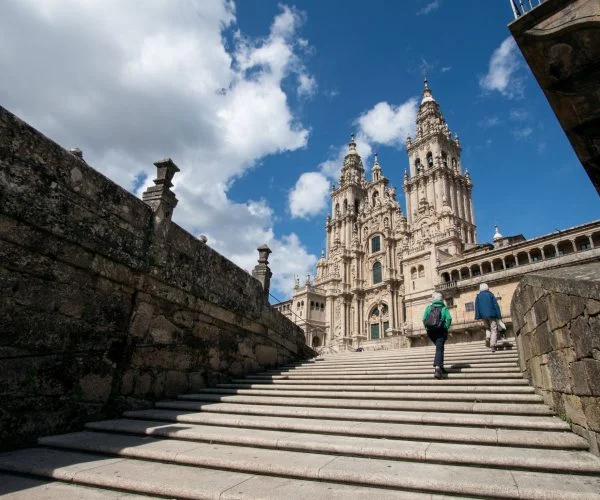
Xacobeo 2021-22: Holy Year On The Camino De Santiago

9 Interesting virtual tours for schools to discover at home
We bring you on 9 cool virtual tours for schools taking you around the world, without leaving your home.

Learning on the move: 8 exciting school trips abroad
Looking for ideas for your next school tour? Here are 8 exciting school trips abroad to help your students learn on the move:


Top things to see on a school trip to Amsterdam
Privacy overview.
Necessary cookies are absolutely essential for the website to function properly. This category only includes cookies that ensures basic functionalities and security features of the website. These cookies do not store any personal information.
Any cookies that may not be particularly necessary for the website to function and is used specifically to collect user personal data via analytics, ads, other embedded contents are termed as non-necessary cookies. It is mandatory to procure user consent prior to running these cookies on your website.

Why School Trips Are Beneficial for Students
Home » Why School Trips Are Beneficial for Students
The pandemic has had many implications for students, teachers, and the educational system as a whole—the loss of many school trips among them. Now is the moment to make up for lost time ! Although some may consider school trips as more of a bonus element than an essential part of the school experience, we know just how valuable school trips are for students from first-hand experience .
From the notable academic benefits to the advantages for personal development, we believe passionately that school trips are a vital part of what makes CAS and IB experience so unique. Educational trips allow students to mobilize their learnings while socializing with peers and strangers in a completely different way than many of them have before. It is these experiences that many students remember most from their time at school.
So, if you are looking for inspiration for the 2022/2023 academic year, here are just a few ways school trips can benefit students.
School trips bring subjects to life
Each young person learns a bit differently and ensuring that students receive a wide variety of learning experiences ensures that no one is left behind. Kinaesthetic learners, in particular, benefit immensely from the chance to take a hands-on approach to a topic. For example, a study of 10th-grade students from 2019 evaluated the attitude of students who had experienced learning outside of the classroom with those who had not. The findings showed that the experimental group had a more positive attitude towards science than their peers. It was also found that field trips promote a more vital interest in science.
So, whether studying marine biodiversity in person or learning about different approaches to sustainability by seeing them implemented in a city, the quality of knowledge in virtually all subjects is enhanced when real-life experience is part of the program.

School trips allow for the discovery of new interests
Exposure to new situations, topics, and teaching methods automatically stimulates interest and excites the brain. As such, school trips are a potent tool to cultivate new interests and boost motivation to continue exploring existing ones. School trips abroad and even shorter outings closer to home can provide invaluable inspiration for students. Many Service Learning experiences that students have while traveling, for example, prompt them to implement their own ideas once they have returned home.
School trips benefit the classroom environment
In addition to how a school trip directly impacts a student’s academic education, such as strengthening their understanding of a subject or offering practical memories to be utlized in the exam hall, it will also improve the classroom environment once everyone has returned home. Carving out a block of time to share unique and exciting experiences necessarily improves relationships between students and between students and teachers. This generally translates to improved behavior and engagement at school.
School trips instill confidence and independence
Another hugely important benefit of school trips is gaining the confidence to try new things. An essential step in broadening their horizons , a young person who feels empowered to do things and go places on their own will automatically open up many new and beneficial opportunities. For many students, a school trip might be their first time traveling without their families. This gives students a new level of responsibility for themselves and their belongings.
In addition, travel also taps into the skills needed for public speaking, professional communication, and presentations—all things many students struggle with. Educational trips challenge students who may be timid or tend to avoid engaging with unfamiliar people. By stepping outside of their comfort zone when asking for directions, posing questions to the staff at visits, or even ordering food while traveling—these students’ confidence will enjoy a notable boost.
School trips promote deeper cultural understanding
Trips abroad and even travel within their home country can help students appreciate the wonderful mixture of cultures, cuisines, and traditions that constitute the world around them. Travel is a fantastic opportunity for students to experience cultures outside their own and appreciate the shared characteristics that unite us. Students will also be gifted with first-hand knowledge of how their culture is informed by others and vice versa, leading to deeping understanding, empathy, and international mindedness .
At CAS Trips , we firmly believe that school trips help students gain real-world experience that cannot be taught in a classroom. These enriching and memorable journeys open their minds to different cultures and strengthen their knowledge of the world around them.
Ready to start planning? Get in touch to speak with one of our educational travel experts today.
Subscribe to our newsletter

- The International Baccalaureate 7 Learning Outcomes June 6, 2018
- 15 CAS Activities for Students at Home March 30, 2020
- A Beginner’s Guide to CAS September 19, 2022
- Why School Trips Are Beneficial for Students July 18, 2022
Previous Post The CAS Trips Guide to Planning a School Trip
Next post 12 best destinations for school trips, quick links.
- About CAS Trips
- Reflection Center
- Privacy Policy
- Sustainability
- Student Survey
- Job Opportunities
- Terms & Conditions
- Destinations
- Global Student Exchanges
- Global Student Conference
- Community-Led Service
CAS Trips S.R.O Zahradnickova 1220/20a, Kosire, Prague Czech Republic [email protected] +420 255 71 26 52

- Name * First Last
- Email Address *
- School Name *
- I am a… * Teacher Student Parent
© 2024 CAS Trips. All Rights Reserved.
- Methodology
- Prague Spring
- Lisbon Adventure
- Peru Discovery
- Community-Led Service Trips
- CAS Project Challenge
- Teacher Resources
- I am a... * Teacher Student Parent
- CAS Trips Newsletter Sign me up to receive CAS Trips news and updates
- School Name Name of your school or institution
- I am a... * Student Parent Teacher
Personal Details
- How many members are on your team? * 3 4 5 6
- Team member 1 *
- Team member 1 email *
- Team member 2 *
- Team member 2 email *
- Team member 3 *
- Team member 3 email *
- Team member 4 *
- Team member 4 email *
- Team member 5 *
- Team member 5 email *
- Team member 6 *
- Team member 6 email *
Supervisor Details
Project details.
- What is the name of your CAS Project Challenge? *
- Please mention the specific city *
- Which UN SDGs does your project focus on? (Select all that apply) * SDG 1 SDG 2 SDG 3 SDG 4 SDG 5 SDG 6 SDG 7 SDG 8 SDG 9 SDG 10 SDG 11 SDG 12 SDG 13 SDG 14 SDG 15 SDG 16 SDG 17 You can explore the UN SDGs at www.castrips.org/unsdg
Documentation
Video submission.
- By Submitting your CAS Project Challenge you agree to our Privacy Policy.
- Sign me up to receive CAS Trips news and updates
An official website of the United States government
The .gov means it’s official. Federal government websites often end in .gov or .mil. Before sharing sensitive information, make sure you’re on a federal government site.
The site is secure. The https:// ensures that you are connecting to the official website and that any information you provide is encrypted and transmitted securely.
- Publications
- Account settings
Preview improvements coming to the PMC website in October 2024. Learn More or Try it out now .
- Advanced Search
- Journal List
- Front Public Health
Getting Out of the Classroom and Into Nature: A Systematic Review of Nature-Specific Outdoor Learning on School Children's Learning and Development
1 School of Education, Western Sydney University, Kingswood, NSW, Australia
2 School of Health and Human Performance, Dalhousie University, Halifax, NS, Canada
Eric Brymer
3 Discipline of Psychology, Southern Cross University, Bilinga, QLD, Australia
Rowena Passy
4 Plymouth Institute of Education, University of Plymouth, Plymouth, United Kingdom
5 SR Nathan School of Human Development, Singapore University of Social Sciences, Singapore, Singapore
Pasi Sahlberg
6 Faculty of Education, Southern Cross University, Lismore, NSW, Australia
Kumara Ward
7 School of Education and Social Work, University of Dundee, Dundee, United Kingdom
Peter Bentsen
8 Department of Geosciences and Natural Resource Management, University of Copenhagen, Copenhagen, Denmark
9 Center for Clinical Research and Prevention, Copenhagen University Hospital, Frederiksberg, Denmark
Christina Curry
Rachel cowper.
10 Thrive Outdoors, Inspiring Scotland, Edinburgh, United Kingdom
Associated Data
The original contributions presented in the study are included in the article/supplementary material, further inquiries can be directed to the corresponding author/s.
Background:
The value of natural environments for developing children's self-identity and social skills has been known for some time, and more recently the potential of nature-specific (i.e., excluding built environments) outdoor learning for achieving academic outcomes has been explored. Connecting children with natural spaces has been shown to benefit their physical and mental health; however, the utility of nature-specific outdoor environments as a setting for curricular and non-curricular learning has yet to be clearly established. Our aim was to undertake a narrative synthesis of international evidence of nature-specific outdoor learning and its benefits for personal and social development, wellbeing and academic progress.
This systematic review searched publications between 2000 and 2020 in nine academic databases for evidence of socio-emotional and academic benefits of nature-specific outdoor learning in school-aged educational settings, using concise search criteria registered with PROSPERO. The total search results of 17,886 records were initially screened by title, and then two reviewers made blind reviews of the title and abstract of 1,019 records.
147 original research studies meeting the criteria were identified. Learning settings ranged across outdoor adventure education, school gardens, field trips, and traditional school subjects taught in natural environments. Study characteristics were summarized, and risk-of-bias tools assessed quality of research as generally moderate, although with a wide range. The reported benefits of learning in natural outdoor settings include: increased student engagement and ownership of their learning, some evidence of academic improvement, development of social and collaborative skills, and improved self-concept factors.
Conclusions
Nature-specific outdoor learning has measurable socio-emotional, academic and wellbeing benefits, and should be incorporated into every child's school experience with reference to their local context. Teacher pre-service and in-service education needs to include a focus on how natural settings can be used effectively for learning. Further research is needed to clarify the conditions under which specific forms of outdoor learning are most efficacious for various target outcomes. It is recommended that future studies measuring outdoor learning adopt established methodologies to improve the quality of research in this field.
Systematic Review Registration
https://www.crd.york.ac.uk/prospero/display_record.php?RecordID=153171 .
Introduction
An international “renaissance of interest” ( 1 ) has emerged in learning outside the classroom in recent years, as the shortcomings of a test-dominated model of education have become apparent. Sahlberg ( 2 ) for instance, commented that this narrowly focused test-oriented model of education reduces the range of learning activity for students, and has the effect that “when educational performance is determined by students' test scores in reading, mathematics, and science, it reduces focus on whole-child development due to decreasing time for arts, music, drama, and sports” (p. 138). At the same time, there is an increasing body of research that demonstrates how students can benefit from learning outside, not only in terms of the curriculum, but also with respect to social, personal, and physical development ( 3 , 4 ). UNICEF's report on the factors that shape child well-being in affluent countries lists “good mental well-being” as a “key aspect of quality of life”, and notes that “ore time playing outside is linked to much higher levels of happiness” ( 5 ). There is strong resonance with a frequently held principle in many Western, and especially Scandinavian, countries, that nature must play an integral role in childhood education ( 6 – 9 ).
This paper presents an examination of the literature on nature-specific learning outside the classroom (NSLOtC) and the types of benefits and/or impacts such opportunities have on children. Our scoping paper ( 10 ) used the term “outdoor learning”, however we have chosen the more precise term of NSLOtC. Following Atencio et al. ( 11 ), NSLOtC includes practical and experiential learning activities conducted outside in school grounds and other locations such as parks, forests, residential camps/centers or on expeditions. Activities can be curricular or non-curricular, focus on different areas of cognitive, social, emotional and moral development, and be related to indoor learning. This type of learning may take place during curricular time or outside school hours. It is narrower in scope than generalized learning outside the classroom (LOtC), which includes off-campus learning in natural or built environments and/or visits to sites such as museums, galleries and/or historical monuments ( 12 ). Whilst there have been systematic reviews of research on exposure to natural environments without regard to learning, and on LOtC irrespective of whether the setting is natural or built, this paper draws together research on various forms of learning in natural environments, across formal and informal curricula, spanning a range of school student age groups.
Benefits of Being in Nature
A mounting body of research clearly indicates that spending time in natural settings which have not been “hardened” or “improved” is good for human and planetary wellbeing ( 8 , 13 – 15 ). However, people in industrialized and urban settings are spending less time outdoors ( 16 ). In particular, children are moving indoors at a vital time in their growth and development when the evidence-base suggests they would benefit from time outdoors ( 7 , 17 ). This reduction of interaction with nature is reflected in the experiences of young people, and is becoming increasingly apparent in educational settings worldwide ( 8 , 18 ). Ensuring children have adequate access to nature is of critical importance for their health and wellbeing ( 13 , 15 , 19 ). However, while there has been an international recognition that schools are vital for enhancing wellbeing in young people ( 20 ) and for developing pro-environment attitudes and behaviors ( 21 ), most schooling is guided by the concept of indoor learning and four-walled classrooms.
Nature, Wellbeing and Young People
As noted above, student wellbeing has become an important aspect of education, and often refers to overall development and quality of life. While there is no one commonly agreed definition of wellbeing, descriptions often focus on psychological notions such as positive mental health, a sense of purpose and belonging, high life satisfaction and the ability to manage stress and life challenges ( 22 ). General agreement, however, exists about the minimum conditions of wellbeing, which include the presence of positive emotions, life satisfaction, fulfillment and positive functioning ( 23 ). There have been two main perspectives on wellbeing namely, hedonistic and eudemonic wellbeing. The former relates to finding pleasure and avoiding pain, whilst the latter refers to meaning and purpose. Though still in the early development of hedonistic psychology, these were considered to be distinct entities, and recent literature on wellbeing has promoted a more holistic approach incorporating both approaches ( 22 ). Studies examining wellbeing in young people have also included social (e.g., relationships), environmental (e.g., integration with nature) and physical dimensions of wellbeing, as well as the importance of play, learning, a sense of belonging and life satisfaction to the perception of wellbeing ( 24 , 25 ). Wellbeing is a complex, multi-dimensional construct, which cannot be measured by using a single indicator in any given context ( 26 ). Research that measures student wellbeing needs to be based on the multi-dimensional nature of wellbeing, such as the right of children to happiness, and the importance of their ability to enhance their wellbeing in the present and in the future ( 27 ).
The multifaceted nature of wellbeing means that various domains can differently affect students' life satisfaction and wellbeing, with each domain operating as a condition for and a consequence of the other domains ( 28 ). It can therefore be argued that the physical environment in which these domains operate has a considerable impact. Research shows that access to open and natural spaces supports improved physical health, with time outside in nature also having beneficial effects on cognitive and mental health ( 29 ).
Several systematic reviews have assessed wellbeing outcomes from interactions in natural environments for various populations. For example, Gill ( 30 ) reviewed 71 studies involving primary aged children's experience of nature, and found benefits to mental health, emotional regulation and environmental knowledge and attitudes. Holland et al. ( 31 ) concluded that “wildland” recreation resulted in psychological, social, and educational benefits, across 235 studies with mostly adult participants. Tillman et al. ( 32 ) similarly explored the effect of nature on mental health specifically in participants aged 0–18 years old. An experience of nature positively influenced mental health across the 35 studies, however only 15 of these involved active engagement with nature rather than passive exposure.
Three systematic reviews shared the focus of this review on educational experiences in natural settings. Becker et al. ( 3 ) reviewed 13 studies with regular weekly or fortnightly classes in the outdoors, and found emerging evidence for social, academic, physical and psychological change. Mygind et al. ( 19 ) examined immersive nature learning experiences, most of which were secondary school aged participants in expedition and residential adventure programs. They identified 84 studies, and further analyzed 36 quantitative studies, finding immediate benefits to a range of mental, physical and social health outcomes. Finally, Miller et al. ( 33 ) investigated nature-based learning in primary aged children, and observed positive evidence for social and educational development, and emerging evidence for engagement, mental health and wellbeing. Collectively, these reviews support the value of nature immersion for people of all ages, and various educational benefits of nature-specific learning for students from particular age groups and outdoor learning settings. This review aims to build on these previous efforts in order to clarify the socio-emotional and academic benefits of NSLOtC for all school aged children across a range of outdoor contexts.
In summary, engaging with nature is important for the health and wellbeing of young people, and providing opportunities that best leverage this relationship is likely to have the greatest impact. NSLOtC could be a vital medium for developing wellbeing and understanding how best to facilitate these experiences is essential to ensure effective learning design.
The Emergence of Nature-Specific Learning Outside the Classroom
Most government policymakers, curriculum designers and school leaders recognize the importance of psycho-social and wellbeing factors for students' development as well as academic outcomes ( 34 ). An emerging interest in NSLOtC has led many schools and individual teachers to consider how learning in nature can realize these potential benefits. Indeed, across the world, NSLOtC is becoming increasingly common. For example: the “udeskole” Scandinavian philosophy of curriculum learning in local outdoor settings ( 35 ), the outdoor adventure education movement pioneered by Outward Bound ( 36 ), active learning in Scotland ( 37 ), and experiential learning in school gardens ( 38 ). However, despite this growing interest, there is a dearth of guidance as to which NSLOtC approaches are appropriate in various contexts, and what specific outcomes they might achieve and for whom ( 33 ). This limits the potential leveraging of NSLOtC settings to improve learning and health and wellbeing outcomes for children and young people, potentially leading to inefficient and ill–targeted investment decisions.
This review provides clarification of the benefits of NSLOtC experiences of school children across all ages, incorporating a range of curricular and non-curricular learning contexts. The aim is to provide a resource for decision-makers in government, university pre-service teacher education, school districts and other interested groups by outlining: possible interventions; the potential development, wellbeing and academic learning outcomes of NSLOtC; and, the target beneficiaries.
The search procedure was registered with the International Prospective Register of Systematic Reviews (PROSPERO) Number CRD42020153171. Figure 1 describes the screening process. Nine databases (ERIC, ProQuest, PSYCInfo, PubMed, Sage, Scopus, Taylor and Francis, Web of Science, Wiley) were accessed by the international review team, yielding 17,886 hits with a keyword in the each of the three categories (education outside the classroom, learning, and wellbeing) and published between 2000 and 2020, outlined in our protocol paper ( 10 ). Duplicates were removed in Endnote, and 13,148 unique records were copied to an online screening tool, Rayyan ( https://www.rayyan.ai/ ).

Screening process.
A detailed description of inclusion and exclusion criteria is covered in Mann et al. ( 10 ). The criteria for inclusion in this systematic review were:
- School-aged participants (Kindergarten to Year 12).
- Learning substantively based in a natural outdoor setting.
- Regular sessions, or a multi-day residential program.
- A measurable learning outcome (academic, wellbeing or socio-emotional).
- Original research published in English.
The principal reviewer screened records by title to remove studies that clearly did not meet the inclusion criteria, yielding a total of 1,019 records. Two reviewers then read the title and abstract and made blind inclusion decisions, with any conflicts resolved collaboratively between them. This further reduced the list to 243 records. Lastly, the full text of each article was read and screened by one member of the review team, with conflicts resolved by the principal reviewer, resulting in a final total of 147 included records.
Reviewers recorded the study characteristics of each included article and used established checklist tools to rate the qualitative and/or quantitative research quality in the study. Quantitative studies were assessed using the CCEERC tool ( 39 ), which rates factors including: participant selection and sample size, operationalisation of concepts, appropriateness of statistical techniques and ethical standards. Qualitative studies were similarly assessed with the JBI Checklist ( 40 ), which incorporates: congruity between the research methodology with methods, analysis and interpretation of results, representation of the participants' voices, influence of the researcher, and ethics standards. These checklist tools require a rating of +1, 0 or −1 for each of 11 and 10 questions, respectively, and were adjusted to produce a score between −10 and +10. The full list of rating items and checklist references are included in Mann et al. ( 10 ).
A preliminary survey of the measured outcomes was conducted before identifying outcome categories. The three broad areas of learning defined in the literature search (socio-emotional, academic and wellbeing) provided a lens for determining these categories.
This systematic review of NSLOtC research began with a broad reach and included a large number of primary studies, compared with similar systematic reviews [e.g., 3, 19, 33]. A total of 147 studies were included in the final review.
Study Characteristics
The dataset included research conducted across 20 countries, with most studies conducted in the United States of America (54). Multiple studies were also conducted in the United Kingdom (27), Australia (15), Canada (8), Denmark (6), New Zealand (6), Spain (4), South Africa (4), Sweden (3), Germany (2), Singapore (2) and Turkey (2). Frequency of research generally increased over time, with the most studies published in 2018 (see Figure 2 ).

Published studies by year.
The number of participants in each study varied greatly, from qualitative ( M = 47, SD = 88) to quantitative ( M = 208, SD = 200) and mixed method ( M = 191, SD = 234) research designs. Figure 3 provides a graphical representation of participant numbers, grouped by tens then hundreds. The majority of studies (60%) were conducted with secondary (Year 7–12) school aged participants, while 36% involved primary (Year 3–6) and 4% were carried out with infants' (Kindergarten—Year 2) school aged children (see Table 1 ). Almost all studies (127) had mixed gender participants, with only 11 female-only studies, 5 studies in male-only settings, and 8 studies where participant gender was not specified.

Participant number by research design type (grouped by tens then hundreds).
Outdoor learning contexts by participant age.
Studies which had multiple ages were counted for each category .
Categories for outdoor learning contexts were formed after an initial survey of the dataset, and Table 1 shows that the most common contexts were adventure education (25%), residential camps (22%), curricular lessons conducted in the outdoors (20%) and school gardens (16%). Regular field trips (7%), adventure therapy (3%) and school grounds (2%) were less common contexts for research. Adventure education studies were conducted almost exclusively with secondary students, which may be reflective of practice in this field. In contrast, curricular lessons in the outdoors and school garden learning were studied predominantly with primary students. Research into residential camps was well represented across both age groups, however more studies were conducted with secondary students.
Learning outcome categories were similarly developed after a preliminary inspection of the data, informed by the three literature search areas (academic, socio-emotional, wellbeing). The most common reported outcomes were so called “soft skills”, relating to a student's developing understanding of their self-concept and intrapersonal skills (e.g., self-confidence, resilience) and their social and interpersonal skills (e.g., communication, teamwork). Wellbeing (e.g., mood, positive self-concept, sense of calmness) was a pre-determined area of interest, and was combined with mental health (e.g., emotional health functioning, self-determination factors) as these outcomes were intertwined. As well as summative academic progress (e.g., reading level, mathematics development), a number of studies focused on formative academic learning skills (e.g., planning, critical thinking) and engagement with learning (e.g., motivation to be at school, classroom engagement), and a few studies measured school attendance after participation in NSLOtC.
Environmental knowledge and attitudes (e.g., knowledge about and interest in animals, environmental stewardship) were not anticipated to be a discrete category from general academic outcomes, however a significant proportion of studies focused specifically in this area which justified its own outcome category. A recent report published by the Child and Nature Network ( 41 ) examined the growing body of evidence that shows how interactions with nature influence positive environmental behaviors. For example, stewardship and positive conservation behavior can be promoted by spending time in nature, having role models in care for nature, and positive experiences in nature. In order to support children and young people in becoming agents of change, Chawla ( 42 ) proposed place-based learning experiences and opportunities for agency and authentic participation in civic decision-making and actions related to the local environment. This is echoed by others who argue the need to go beyond cognitively-oriented engagement with the natural world to include the affective domain and opportunities for genuine agency ( 41 , 43 , 44 ). Prince ( 45 ) argued that outdoor learning facilitates pro-environmental behavior in children through role modeling, the provision of mentors and modeling actual practice in context. Echoing this, Brymer and Davids ( 46 ) highlighted the need to ensure that outdoor experiences designed to enhance pro-environmental behaviors were directly related to the everyday context of the learner. This implies we need to reconsider the role of nature experiences in education and to recognize that successful implementation requires experiential approaches which engage all domains of learning in context.
Personal and social development outcomes were measured most frequently (see Table 2 ), including: intrapersonal (24%) and interpersonal (19%) development, along with the related factors of mental health and wellbeing (14%). Environmental knowledge and attitudes were assessed in 17% of studies. Learning factors were less studied, including engagement with learning (11%), academic progress (9%), general learning skills (4%) and school attendance (2%). When interrogated by age, Table 2 shows that personal/social development and wellbeing has been studied more with secondary aged participants, whereas environmental knowledge and attitudes have been researched more with primary aged children. Academic learning outcomes have been similarly studied across age groups.
Number of studies by outcome type and age.
Studies which had multiple outcomes and ages were counted for each category .
Learning outcomes were also explored across NSLOtC contexts ( Table 3 ). Adventure therapy predictably focused exclusively on intrapersonal and interpersonal development outcomes, and adventure education was similar (although included some measurement of wellbeing and learning engagement). Curricular programs such as field trips, curricular outdoor lessons and school gardens had a mixed focus on both personal development and academic learning outcomes. Residential camps focused more on personal development outcomes, but also included some academic learning outcomes. This likely corresponds with the focus of some camps being curricular (e.g., science camp) and others non-curricular (e.g., summer camp). Unsurprisingly, environmental knowledge and attitude were common outcomes in field trips, residential camps and school gardens, where they were the predictable focus of learning.
Number of studies by outdoor learning context and measured outcome.
Studies which had multiple outcomes were counted for each category .
Research Quality
Quantitative and qualitative research designs made up 40 and 37% respectively of the total studies, with fewer studies (23%) employing a mixed method design. Forty-four percent of quantitative studies, 35% of mixed methods studies and 2% of qualitative studies utilized a comparison group. Average research quality was rated at a medium level (5.28), with only 50% of quantitative studies and 25% of qualitative studies given a high (7 or above) rating (see Table 4 ).
Research quality by study design.
Mixed methods research quality was assessed separately for quantitative and qualitative components .
When research quality is assessed by outdoor learning context, it can be seen in Table 5 that regular field trips had the lowest quality of research (especially in qualitative studies), along with quantitative research in school gardens. The strongest research quality was in outdoor curricular lessons.
Average research quality by study design and outdoor learning context.
Research Outcomes
Research variables were apportioned to broad learning categories as described in Table 2 . Almost all studies reported some positive change in the variables they measured; however, in some cases there were mediating factors or other complexities to these results. It is beyond the scope of this narrative synthesis to provide a statistical analysis of outcome effect sizes or to report on the findings of every measured variable. More specific outcomes in each outdoor learning context are outlined in Table 6 .
Common research outcomes by outdoor learning context.
Further analysis was undertaken of studies with a higher quality rating (five or above), and 52 quantitative studies met this criterion of research quality. Twenty six studies incorporated a comparison or control group, although some compared two types of NSLOtC [e.g., ( 47 )] or different participant groups [e.g., ( 48 )] rather than using indoor classroom learning as the comparison group. The following statistically significant results were noted amongst these higher quality quantitative studies, listed by outdoor learning context:
- Two of the three adventure therapy studies had a mix of positive and negative results, with the third showing significantly increased resilience after the program. These ambivalent outcomes perhaps reflect the challenging population of at-risk youth with complex needs.
- Eighteen adventure education studies all showed significant changes in self-concept and coping factors, specifically including: resilience (7), self-efficacy/self-esteem (4), life effectiveness skills (3) and pro-social behaviors (3). A number of researchers found that the quality of group experience was a moderating factor for these outcomes, and one study ( 49 ) interestingly observed that participants with a lower national cultural identification gained less from the adventure education program.
- Three studies of field trips all observed significant improvement in environmental knowledge and attitudes, however none compared these gains with a similar group learning in the classroom.
- Three of the nine studies of curricular lessons in the local outdoors focused on student wellbeing, with two of these noting significant improvement but only one including a control group. Another three studies found curricular lessons in the local outdoors significantly improved motivation and engagement, two of which compared with a control group. Academic progress was recorded in three studies, however the one which included a classroom control group found the same gains. This suggests whilst curricular lessons in the local outdoors may not inhibit or accelerate academic performance, they can particularly impact students' wellbeing and engagement.
- Twelve residential camp studies measured intrapersonal and interpersonal skills, as well as environmental attitudes. Five of these studies found gains in self-concept factors across the program, however only one out of three showed a significant difference compared to a control group. Significant improvement in social skills was noted in six studies of residential camps, three of which included comparison with a control group. Two of four studies measured significant improvement in environmental attitudes, with one of these including a control group. One study ( 50 ) found no improvement in environmental attitudes but did show a significant increase in environmentally responsible behaviors. Another study observed that inclement weather during the residential camp actually decreased students' sense of connection to nature ( 51 ).
- Two of the three studies of school garden programs found significant improvement in nutritional attitudes and consumption compared to a control group. The third study ( 52 ) was a four year primary school gardening program, which found significant gains (compared to a control group) in Mathematics, Languages or Science performance at some time points but not others.
Fifty-three qualitative studies were rated with a research quality of five or higher. Outcome themes of these studies are summarized by outdoor learning context:
- Of the ten adventure education studies, five found improvement in interpersonal skills, and other studies noted benefits to personal factors such as: resilience (2), wellbeing (2), self-concept (2). One study with disengaged high school students ( 53 ) found that regular adventure education sessions improved overall school attendance, punctuality and engagement.
- Three studies of regular field trips all focused on deeper environmental awareness, and one study also observed that the open-ended learning context of field trips facilitated students' development of agency, self-regulation and resilience ( 54 ).
- In the thirteen studies of curricular lessons in the local outdoors, common outcome themes included: social and teamwork skills (7), wellbeing (5), environmental awareness (4), self-confidence (3) and learning-readiness skills such as concentration and engagement (3). Whilst most studies did not focus on academic achievement, one study of foreign language classes held in the outdoors found that students' fluency improved as well as their confidence and motivation to develop their spoken language skills ( 55 ).
- Environmental knowledge and attitudes were the focus of six of the thirteen residential camp studies. Fulfillment of basic psychological needs, as viewed through the lens of Self Determination Theory ( 56 ), was regarded as a mediating factor for motivation and wellbeing outcomes in three studies. A deeper understanding of STEM and increased interest in science inquiry was the focus of one residential camp study ( 57 ).
- Across the twelve studies of school garden programs, major themes included: self-confidence/self-esteem (6), interpersonal skills (4), wellbeing (3), responsibility (3), independence (3), engagement (3), and environmental attitudes (3). A notable study of high school students with disruptive behaviors ( 58 ) found that a gardening program improved school attendance, responsibility for their work, skills development and number of subject pass grades. Two researchers contended that the student-centered pedagogical approach was a mediating factor in the positive outcomes they observed.
This study set out to examine the literature in NSLOtC with the particular purpose of examining the quality of research and the potential for designing school-based learning and development in nature contexts. Depending on the design of the program, NSLOtC can enhance students' health and wellbeing, curriculum and environmental knowledge. An analysis of the literature reveals considerable diversity in terms of types of nature-specific learning offered to school children, but NSLOtC in all its forms affords opportunities for enhanced health and wellbeing, social engagement and curriculum specific outcomes.
Research within each outdoor context has generally been conducted in isolation from others, reducing the global understanding of NSLOtC across various learning contexts. The most commonly studied outdoor learning context was adventure education, which was largely conducted with secondary age students and measured personal and social development outcomes. The lack of long-term follow-up also makes it hard to determine if the outcomes measured impacted on learning across curriculum and years. The other common area of NSLOtC research was in the context of school gardens and curricular lessons, and these focused on primary aged students and explored learning and development factors. Wellbeing benefits were measured less often, however were represented across all outdoor learning contexts. These results might be associated with ease of measurement and the convenience of captive participant groups, rather than the value of the experience per se . At the same time, it is worth noting that delivery of each outdoor learning experience requires different skillsets.
The quality of NSLOtC research varied greatly, as has been noted in previous similar reviews ( 3 , 19 , 33 ). This could reflect the importance of the learning environment in facilitating the measured responses, especially considering the impact of activities in natural environments on data collection. Research examining regular field trips was of particularly poor quality, most likely reflecting the potential confounding variables of this type of experience. Most NSLOtC studies had at least moderate quality, and curricular lessons in the local outdoors had the highest rigor across quantitative and qualitative research designs.
Interpreting the value of NSLOtC beyond the participant group being studied is constrained by participant cohorts and cultural perspectives. As a significant number of studies were conducted in North America and the United Kingdom, the cultural impact of NSLOtC design and relevance of outcomes measured is unclear. Research across different cultures, and that specifically considers diversity and inclusion within student groups, will enrich our understanding of how best to design NSLOtC. While there is a small research base documenting wellbeing and mental health benefits of outdoor learning, these outcomes need to be studied more thoroughly across age groups and learning contexts. Outdoor curricular lessons and learning in school gardens have clear benefits for primary school aged students, and these also need to be studied in secondary settings. Conversely, the personal and social gains secondary students experience from adventure education should be further researched for primary students. Pro-environmental knowledge and attitude have mainly been studied in the contexts of residential camps, field trips and school gardens; however, they also need to be studied in adventure and curricular outdoor learning contexts to explore whether improvements can be achieved in those settings also.
There are a number of studies showing neutral or positive impacts for NSLOtC on academic outcomes for both primary and secondary students, compared with control groups. This finding is intriguing as it suggests that the indoor classroom may not be the only environment where effective academic learning occurs, not to mention the socio-emotional learning opportunities provided by natural outdoor settings. While this needs to be researched more thoroughly, the implications are that classroom teachers might benefit from initial teacher education curricula and professional development that enables them to deliver learning in nature-specific environments. Many of the NSLOtC studies described a student-centered style of learning, and a different student relationship with adult learning facilitators compared to a regular classroom teacher. These learning-mode factors could mediate the effectiveness of NSLOtC, and research comparing outdoor and indoor learning using similar teaching and learning approaches would help to tease out causal factors. Future research could include studies examining the impact of different environments, as well the relationship between environment and teaching and learning design. One size does not fit all, so in the first instance research design will need to reflect this contextual approach.
The current body of research has established that various manifestations of NSLOtC can effectively produce holistic learning, wellbeing and development outcomes; however, comparison across outdoor learning contexts has been rarely studied. Miller et al. ( 33 ) noted that it is currently unclear which elements of nature-based learning positively impact engagement and social outcomes. The next challenge for NSLOtC research is to explore the mechanisms of this demonstrated effectiveness, in order to uncover foundational elements which are common across outdoor learning settings, and other factors which are context-specific. In calling for a unification in NSLOtC research, however, we caution against a “drag and drop” approach to NSLOtC practice, where an effective model in one context is replicated in another setting without regard to local educational, environmental and cultural factors ( 59 ).
In order to achieve a high level of rigor, future NSLOtC research should incorporate the following elements:
- Thorough description of the NSLOtC intervention including: participant background, contextual factors, frequency and duration of sessions, pedagogical approach, students' experience of the intervention, and justification for chosen measures.
- A comparison or control group learning the same material in an indoor classroom setting or an alternate outdoor setting, to ascertain whether the chosen type of NSLOtC has any additional benefit to the learning variables of interest.
- A mixed methods and/or longitudinal design, including quantitative measures of objective change and/or in-depth qualitative approaches.
- Conclusions which go beyond simply whether NSLOtC is effective, and rather present a more sophisticated picture of how it works most effectively for whom and in what settings.
This review builds on evidence from previous systematic reviews which assessed research in natural environments ( 30 – 32 ). In general, those reviews reflect the findings in the current systematic review, where nature-based experiences enhance mental health, emotional regulation and environmental knowledge and attitudes. Systematic reviews that focused on educational experiences in natural settings ( 3 , 19 ) similarly found social and academic benefits. While previous reviews did not focus on school-aged children alone or educational learning specifically, the current review adds to and consolidates this evidence base by reviewing natural outdoor learning experiences across all school aged children, and incorporating curricular and non-curricular learning contexts.
Although the large scale of this review suggests findings are indicative of widespread benefits, the current systematic review had some limitations. Gray literature was not accessed due to the extensive size of the 16,000 items in the initial dataset, and although articles were double screened for inclusion, their research quality was only rated by a single reviewer for each paper. Further, some databases (e.g., SPORTDiscus), which may have yielded further NSLOtC research, were not accessed. One criterion of inclusion was that articles were written in English, which would have excluded a small number of studies published in other languages and skewed the reported international spread of research and culturally specific interpretations. Even within English speaking countries, there are a wide variety of cultural and pedagogical contexts within which NSLOtC occurs, and therefore the general findings of this review should not be applied to individual contexts without due regard to local factors. The most significant limitation of the current review was that a statistical analysis of outcome effects was not possible due to the variety of study designs and broad range of measured outcomes.
There is sufficient research evidence to show the importance of NSLOtC experiences for school students. The following recommendations are made by the international team which conducted this systematic review:
- Educational policy-makers need to recognize that NSLOtC is no longer a fringe “nice-to-have” approach to teaching and learning. Instead, NSLOtC is an effective pedagogical approach for holistic growth, which means that resources should be made available for implementation in curricula and learning design [( 60 ), in press].
- All university pre-service teacher programs should include skill development activities for the design and implementation of NSLOtC in the upcoming teacher's subject area.
- Design and implementation of NSLOtC is an important part of current practicing teachers' skill development, and professional development courses should be designed and delivered for in-service teachers.
- Future research in NSLOtC needs to be carefully designed following rigorous methodologies to evaluate and differentiate between nature-specific and classroom settings, various outcomes, and what elements contribute to these outcomes.
- Future researchers might also focus on designing effective NSLOtC research studies, which lead to rigorous findings.
- Environments which are local to, and within, school grounds need to provide opportunities for everyday NSLOtC experiences.
This systematic review built upon the work of previous research reviews by incorporating wellbeing, socio-emotional development and academic learning outcomes for school aged children in various nature-based outdoor learning contexts. The 147 included studies indicated significant support for the benefits of NSLOtC, particularly in personal and social development for secondary aged students in adventure education programs, and in social and academic learning outcomes for primary aged students in school garden and curricular outdoor learning settings. The review identified that most NSLOtC research has been conducted in North America and the United Kingdom, and that research in each outdoor learning context tended to be clustered with specific outcome types and student age groups. The quality of research was moderate on average, although there was a wide range. Recommendations from this systematic review include: the provision of NSLOtC in national and state curricula, subject-specific training in NSLOtC for pre-service and in-service teachers, and rigorous design of future NSLOtC research.
Data Availability Statement
Author contributions.
All authors listed have made a substantial, direct, and intellectual contribution to the work and approved it for publication.
Conflict of Interest
The authors declare that the research was conducted in the absence of any commercial or financial relationships that could be construed as a potential conflict of interest.
Publisher's Note
All claims expressed in this article are solely those of the authors and do not necessarily represent those of their affiliated organizations, or those of the publisher, the editors and the reviewers. Any product that may be evaluated in this article, or claim that may be made by its manufacturer, is not guaranteed or endorsed by the publisher.

Benefits of A School Trip
Field trips have long been a staple of educational experiences, offering students the opportunity to venture beyond the classroom and immerse themselves in real-world settings. These trips provide many benefits beyond traditional teaching methods, enriching students’ learning experiences and broadening their horizons whilst imparting long lasting memories.
In this article, we discuss the various advantages of field trips and why they are essential for comprehensive education based on the responses to a survey conducted with international schools in Malaysia and Brunei.
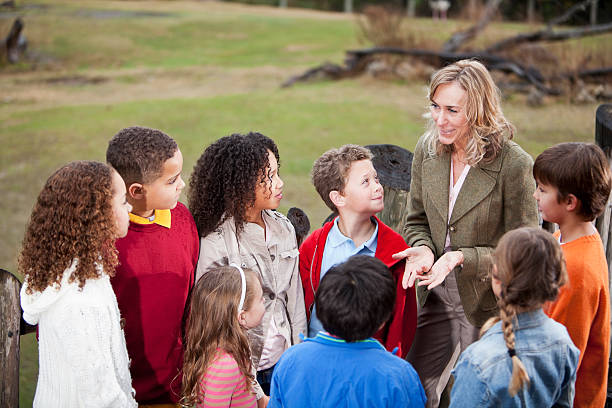
Enhances in-class Learning
Field trips serve as a powerful tool for deepening students’ understanding of classroom knowledge. By observing firsthand how scientific principles, historical events, or artistic concepts manifest in the real world, students are able to strengthen their understanding and foster critical thinking skills.
Field trips provide a link between theoretical learning and practical application, allowing students to make meaningful connections and gain a comprehensive understanding of the subject matter. Whether it’s observing chemical reactions in a science laboratory or exploring historical artefacts in a museum, these experiential learning experiences enhance students’ grasp of the curriculum and encourage them to actively engage with the material.
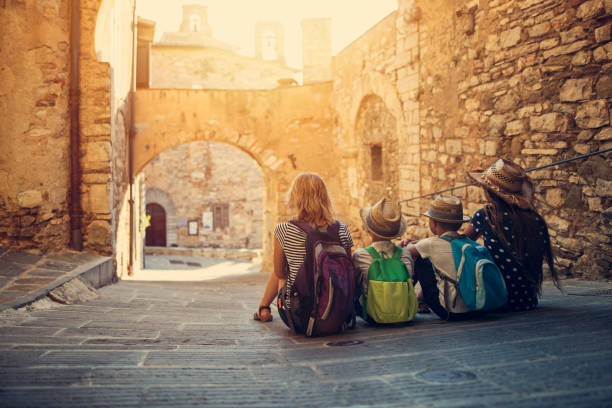
Cultural Enrichment
Field trips offer students the opportunity to experience and appreciate diverse cultures, communities, and ways of life. Visits to museums, historical sites, cultural landmarks, or neighbourhoods different from their own can foster empathy, tolerance, and a broader understanding of the world’s diversity. Students can participate in different traditions, customs, and perspectives, broadening their horizons and challenging their preconceived notions. These encounters with cultural diversity promote acceptance, respect, and an appreciation for the richness of human experiences.
Fun fact: International schools have the flexibility to plan field trips to different countries, offering students exposure to diverse cultures, while public schools in Malaysia primarily focus on local destinations within the country. While both types of schools offer enriching field trip experiences, international schools provide the added dimension of international exploration and cross-cultural learning.
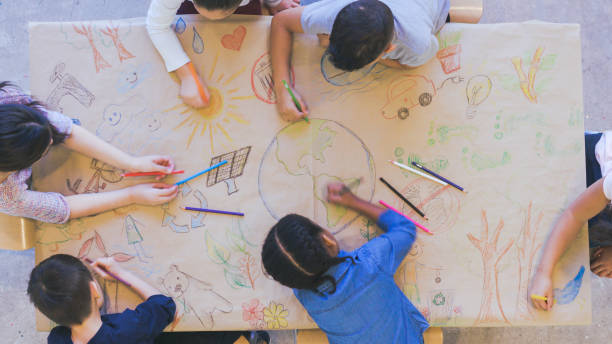
Social and Emotional Development
Field trips offer opportunities for social and emotional growth as students engage in team building and collaboration. Students develop important social skills by navigating new environments together, solving problems collectively, and relying on each other’s strengths. Interacting with peers in a non-classroom setting allows for the formation of new friendships, the building of trust, and the development of effective communication skills. Field trips also present challenges that require adaptability and resilience, encouraging students to step out of their comfort zones and build self-confidence.
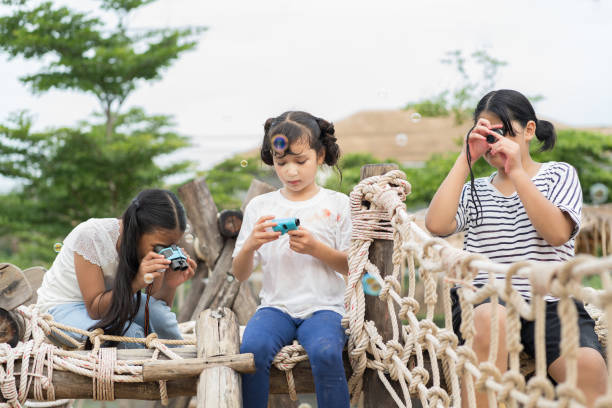
Career Exploration
Field trips provide invaluable exposure to various professions and industries. Visits to workplaces, science centres, or vocational institutions allow students to witness professionals in action and gain insights into future careers. By experiencing different work environments, students can explore their interests, understand the practical applications of their studies, and make informed decisions about their educational and career paths. Field trips bridge the gap between education and employment, inspiring students to pursue their passions and providing them with a clearer vision of their future goals.
Did you know that aviation pioneer, Amelia Earhart, found inspiration during a field trip to an airfield, where she had her first flight experience? This trip sparked her curiosity and motivated her to pursue a career in aviation. She became the first female aviator to fly solo across the Atlantic Ocean and played a significant role in advancing women’s participation in aviation.
Filed Trips Hosted by International Schools
International schools in Malaysia typically schedule field trips throughout the academic year as part of their curriculum to enrich their students’ learning experiences. The timing and frequency of these field trips may vary between schools, but they are often planned in connection with specific subjects or units of study or towards the end of the school term or semester.
The organised field trips are often to a wide range of destinations, both within Malaysia and internationally. Students may have the opportunity to visit local historical sites, cultural landmarks or states, science centres and museums, as well as travel abroad to experience different cultures, explore renowned landmarks, or participate in educational programs.
Here are some international schools in Malaysia that host field trips. Do check each school out to know where they are going for this upcoming summer holidays!
1. Lodge International School
2. Oasis International School
3. Maple Leaf Kingsley International School
4. Epsom College Malaysia
5. Charterhouse Malaysia
6. Wesley Methodist
7. Seri Botani International School
8. Stellar International School
9. Jerudong International School
10. The International School of Kuala Lumpur
11. Sri KDU Schools
12. Mahsa International School
13. Repton International School
14. Invictus International School
15. Acmar International & Private School
16. elc International School
17. St. John’s International School
18. Sayfol International School
Field trips offer invaluable benefits that extend beyond the confines of the classroom, allowing students to experience hands-on learning, cultural enrichment, social and emotional development, and career exploration. These trips foster a deeper understanding of academic subjects, broaden students’ perspectives, and equip them with essential life skills.
Education Destination Malaysia would like to thank the following for responding to the survey on field trips.
• Frances Tan, Deputy Principal, Lodge International School
• Bekah Dawson, Director of School Advancement, Oasis International School
• Ellis Lee, CEO, Maple Leaf Kingsley International School
• Mark Lankester, CEO, Epsom College Malaysia
• Fai, Marketing Executive, Charterhouse Malaysia
• Evelyn Lee, Head of Marketing & Communication, Methodist Council of Education
• Joey Thum, Senior Admissions Executive, Seri Botani International School
• Samuel Kang, Diretor, Stellar International School
• Anne Dickinson, Head of Admissions and Marketing, Jerudong International School
• Nur Sakinah Diyanah binti Abduallh, Digital Lead & Advancement Manager, The International School of Kuala Lumpur
• Wong Sin Yi, Marketing & Admissions Manager, Sri KDU Schools, Kota Damansara
• Edwena Khor, Senior Manager, Business Development, MAHSA International School
• Rexanne Lew, Registrar, Repton International School
• Chua Pauline, Assitant manager, Marketing & Admissions, Invictus International School
• Rao, Sales & Marketing, Acmar International & Private School
• Gavin Hardie, Senior Services Manager, elc International School
• Sujitha Sureyakumaran, Digital Marketing & Communication Executive, St. John’s International School
• Nanthinie Meganathen, Marcomm, Sayfol International School
- Preschool/Kindergarten
- Primary Schools
- Secondary Schools
- Pre-University
- Learning Centre
- Special Education Needs
- Call us Topics in English
- Privacy Policy
- terms of use
Topics in English Topics in english to learn and fluent pronunciation and writing and facilitate conversation between you and others, whether in school, work or daily life
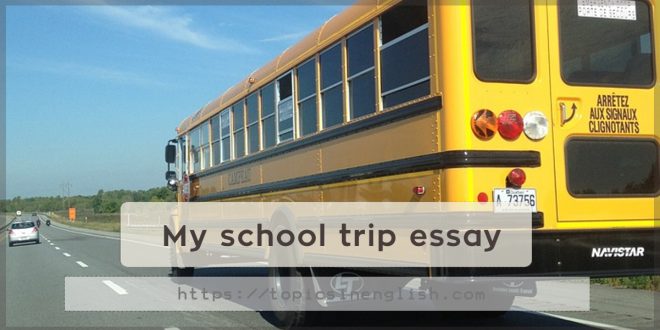
My school trip essay 6 models
Last updated Saturday , 16-03-2024 on 10:22 am
My school trip essay ,School trips leave a great impact in the mind of the student where he goes without his family accompanied by friends and colleagues, which allows him to rely on himself and take responsibility to enjoy the activities of the trip.All this will be here in My school trip essay .
My school trip essay
School trips leave a great impact in the mind of the student, where he goes without his family, with his friends and colleagues, which allow him to rely on himself and take responsibility and enjoy the activities of the trip.
Each school planning for trips is as a recreational and educational way, supervised by social workers and school supervisors, who planning visits, ticketing, bus booking, etc.
I went on a school trip to (name of the city) of (Governorate name). of (city area in km) and (population number) approximately.
I prepared my small bag and put sandwiches, juice and water for the trip. I went to sleep early to wake up early to be full of energy on the journey.
We rode the bus in front of the school in the early morning and we left our parents and friends who did not come with us.
The bus driver displayed a documentary about the city we were going to visit and the tour supervisor told us about the directions and instructions we should follow and how to act in case of lost. He provided us emergency numbers and asked us to write them in a paper and keep in our pocket.
We arrived at our destination and started visiting the (museum name) which is a large museum featuring many important items that tell us the history of the city.
Then we went to visit the open museum which is an open area with many beautiful items.
Then we went to visit the important landmarks of the city.
The last stop of the trip was to visit the amusement park, a recreational city with lots of games.
The supervisor gave us two hours to enjoy our time, play the games we want and assemble before the door of the amusement park in preparation for riding the bus and back to our city.
We gathered two hours later in front of the amusement park door, the supervisor checked everyone’s presence and then we boarded the bus and returned to our city.
It was a beautiful day we enjoyed it a lot and we saw many of the city’s famous sights.
We learned a lot about its history and the history of its inhabitants.
Finally, we reached our city late at night. Our families were waiting for us.
We thanked the tour supervisor and went to our homes to sleep and prepare for school the next day.
a memorable school trip essay
It’s great to enjoy a little bit away from school and home for rejuvenation and energy, and this is exactly what happened. After working hard and excelling in school, I was able to go out on an unforgettable school trip. Through this trip, I was able to define my goals and benefit greatly from them.
This was an excursion to one of the seminars of the great Steve Jones. Just being in the midst of this huge crowd of scientists, inventors and businessmen made me know what I want to become in the future, and what are my upcoming priorities.
On this journey I was able to find answers to many of my questions and found the inspiration I wanted. Now I want to become in the future an inventor of something useful that benefits humanity and achieve great success for me, whether material or moral, through fame.
It is wonderful to know the importance of technology to society and how we inevitably go to it and the development of all means of services around us. And with just a little bit of clinging to the dream and fighting for it like Steve did, I can certainly succeed too.
simple essay on school trip
I feel very happy to go on a trip to the football stadium. This was a big surprise for us, to be able to watch an important match with friends.
Of course, I watched many matches with my family before, but this time the experience is different because it is with my friends and I was able to express and launch my enthusiasm, without feeling any pressure.
I enjoy this experience so much, and for sure I want to repeat this experience in other activities. Now I can’t wait to go home and tell my brother about this experience, and that in the future he should try going out with his friends on school trips and enjoying this holiday. It gives great psychological comfort and a boost of activity that helps to return to study with full vitality and activity.
essay on school trip to a park
Oh my gosh, I can’t describe the beauty of nature that I enjoyed during my last school trip. There is a very big difference between the constant presence between the big and fast industrial life and the relaxation in the vast gardens and parks that do not contain any noise.
It is great to go through this experience and go to one of the most beautiful parks that contain very beautiful gardening works and organized views of trees and roses.
The wonderful engineering work that I saw in the park is one of the best landscapes that my friends and I enjoyed watching.
And certainly immediately we felt the amount of interest and love from the people responsible for this place, and how they can preserve and show this place this beauty.
Of course I would love to go back on a school trip to the park and enjoy physical games with my friends like we did. This was one of the things I enjoyed in nature. It is great to find large green areas. This helped me relax a lot.
school tour experience essay
I would very much like to write an article about my experience in the last school tour, and point out the things I liked the most.
I find this tour very different from many of our previous tours. Previously, the tour was in only one place, and curiosity and enthusiasm ended before the tour ended.
But certainly this was different when we were able to visit many places in the same tour, such as the museum, the garden and the library. All of these places had a different effect.
We find when visiting the museum and meeting one of the guides working in the museum that he has that interesting and funny way of explaining the holdings. It makes you want to know more about its origin and the civilization it comes from.
But due to the lack of time, this made me even more excited, eager to listen. I am also eager to see another place and enjoy. This made it more beautiful and did not leave any way for boredom.
When visiting the library, I was able to sign one of the famous books and see some of the authors of these books. I always watched this event through movies only. It is great to try this experience and get some interesting and useful books.
But certainly nothing is so wonderful after a long day of listening and paying attention as visiting the park and walking around it to release all that energy.
I cannot describe the beauty of how I felt in the experience of the games and activities that we did inside the park. I can say this was the best school trip experience I’ve ever had.
a school field trip essay in English
One of the great school field trips I enjoyed was this trip, this weekend we were able to go on a school field trip to the zoo.
And there were a lot of interesting animals that wanted to feed and take pictures, many pictures with them. But of course, every field trip cannot pass without new experiences, some of which you will benefit from and others that delight you.
I can’t stop laughing whenever I remembered the monkeys, and how they used to behave, I can’t believe how smart this animal is, and how it can make you happy at any time. And also watching the peacock, what a beauty!, I did not feel the consistency and beauty of the colors, as I saw in this bird.
It was wonderful to learn some information about the habitat of many animals, which made me very eager to read about them, how they live and how important the group is to them, and how to unite among them, such as the blue whale and other collective animals that live in groups and like the wolf as well.
Certainly this field trip was very wonderful and contained a lot of information that I benefited from.
In this way we have given you My school trip essay, and you can read more through the following section:
- English essay
Related Articles

Value of Time Essay 3 Models
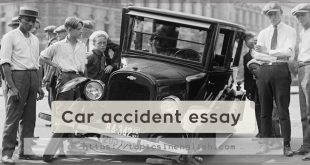
Car accident essay 6 models

Essay on car 10 models
12 comments.
A school trip essay is very excellent and writing way is also perfect
A very good essay. Need more like this.
Yeah. A very good way of writing
Awesome Schools trips are always full of fun and interesting moment. Nice construction, fantastic essay. keep it up.
babi school trip xbagi alamat,tarikh,etc bodo writer
Nice 👍👍👍👍👍👍🙂
This information is truly valuable. I appreciate the practical tips you’ve shared.
Leave a Reply Cancel reply
Your email address will not be published. Required fields are marked *
Search form
The school trip.
Look at the information about a school trip and do the exercises to improve your writing skills.
Instructions
Do the preparation exercise first. Then read the texts and do the other exercises.
Preparation

School trip
Join us on a school trip to Cardiff on Saturday 13th May .
We will spend the morning in the city centre . For lunch we’ll have a picnic in the park . In the afternoon we will visit the Science and Technology Museum .
Meet in the school car park at 8:00 am . Please arrive on time. We will return to the school at 5:30 pm .
IMPORTANT: SCHOOL TRIP UPDATE
Dear Students,
We hope you can come on our school trip next weekend . Unfortunately, the Science and Technology Museum is closed for building work on Saturday, but we have got tickets for St Fagans National History Museum instead. The good news is that entry is free so the trip will now cost £10 each.
Arrival and departure times are the same.
Mr Stuart Noble
Head Teacher
Top tips for writing
When you need to write notes from a text, underline the important information first. Then make short, clear notes.
Check your understanding: gap fill
Check your writing: multiple choice, worksheets and downloads.
Do you enjoy going on school trips? What trips have you been on?

Sign up to our newsletter for LearnEnglish Teens
We will process your data to send you our newsletter and updates based on your consent. You can unsubscribe at any time by clicking the "unsubscribe" link at the bottom of every email. Read our privacy policy for more information.
- Share full article
Advertisement
Supported by
Music Teacher Is Charged With Taking Teenagers on Trips to Abuse Them
Paul Geer taught for decades at the Family Foundation School, a rural reform academy where he abused students, an indictment states.

By Michael Wilson
The music teacher’s classes at the strict, no-nonsense reform school in the woods of upstate New York would seem to be a teenager’s respite amid all the rules, a place for expression and discovery.
But a criminal indictment unsealed Thursday portrayed that teacher as a domineering and abusive tyrant who, during one-on-one trips away from school and outside the state, raped his teenage students or forced them into sexual activity.
The indictment follows years of lawsuits that have portrayed the Family Foundation School , a small boarding academy in rural Delaware County, as something closer to an unsupervised, violent prison.
The teacher, Paul Geer, 56, was arrested Wednesday evening in Hancock, N.Y., where he lives a short distance from the site of the school, which closed in 2014. He was charged with six counts related to bringing three different children across state lines to engage in unlawful sexual activity.
Mr. Geer pleaded not guilty at an arraignment before a federal magistrate judge in Syracuse, N.Y., on Thursday, and was denied release pending a detention hearing set for Monday.
For former students at the school, his arrest vindicated many years of online campaigns and legal battles involving that place and, specifically, that man.
Liz Boysick, 41, identified as “Victim 2” in the indictment, was 16 when Mr. Geer drove her to Pennsylvania ahead of a class trip there and forced her to perform oral sex in his van, she said. Decades later, she was in court to see Mr. Geer in shackles during the hearing.
“It was really powerful hearing what mattered to me counts,” she said afterward. “He will not get one more tear out of me. Now is the time for me to live my life.”
Mr. Geer was in his 20s and living with his parents when an older couple approached him at a choral recital he was leading and offered him a job at the Family School, as it is known, on the spot. They were Tony and Betty Argiros, who founded the school in the 1980s.
For Mr. Geer, that began a career of more than 20 years at the school, which billed itself as a last resort for parents frustrated and distraught by their children’s drug or alcohol abuse or behavioral issues. Former students have said he asked personal questions about their sex lives and singled out children to stay behind with him after class, which was held in a red barn beside a pond.
The indictment described Mr. Geer as a bully who, in addition to subjecting students to “repeated sexual abuse,” forced them to eat moldy food, haul heavy loads of rocks around the campus and endure communication blackouts for long periods.
On three separate occasions outlined in the indictment, Mr. Geer drove students out of state on one-on-one trips and coerced them into sexual activity. The victims were two boys and a girl, ages 14 to 17.
Mike Milia, 45, of Brooklyn, is identified as “Victim 1” in the indictment. He was 14 in 1994 when Mr. Geer took him on a fishing trip to Maine and sexually abused him, according to the indictment.
On the way back to Hancock, Mr. Geer “told him not to tell anyone of what had just happened,” according to a lawsuit filed by Mr. Milia in 2019. That case is pending.
Mr. Geer was questioned about taking a minor to Maine in a deposition that same year.
“In hindsight, I shouldn’t have done that,” he said, but he denied any sexual abuse.
“I think I behaved badly in a lot of ways,” Mr. Geer said in the deposition, referring to his time working at the school. “I definitely was very aggressive.”
The couple that founded the school later retired, and their son, Emmanuel Argiros, who goes by Michael, took over day-to-day operations before it closed. In depositions in 2018 and 2021, the younger Mr. Argiros denied hearing reports of abuse while at the school.
In 2018, The New York Times published an article describing a series of suicides and fatal overdoses by former students. More former students later came forward to describe horrific conditions at the school.
Liz Ianelli is a former student who recounted her time at the school and described the abuses inflicted on her there in her 2023 book, “I See You, Survivor.” She recalled being wrapped from neck to ankle in a blanket that was duct-taped closed, and left on the floor of an empty room, shimmying toward a bowl of tuna for food.
She was among the former students who hastily arranged travel to Syracuse on Thursday for the court hearing.
Sitting nearby was Mr. Milia, watching the man who had taken him to Maine 30 years ago.
“This guy threatened my life when I was 14 years old,” Mr. Milia said after the hearing. “When he walked through that door, it was the first time I felt like he couldn’t hurt me anymore. I am not scared anymore.”
Michael Wilson , who covers New York City, has been a Times reporter for more than two decades. More about Michael Wilson
Israel calls off school trips, puts forces on full alert amid Iran threat
- Medium Text

The Reuters Daily Briefing newsletter provides all the news you need to start your day. Sign up here.
Writing by Dan Williams
Our Standards: The Thomson Reuters Trust Principles. New Tab , opens new tab
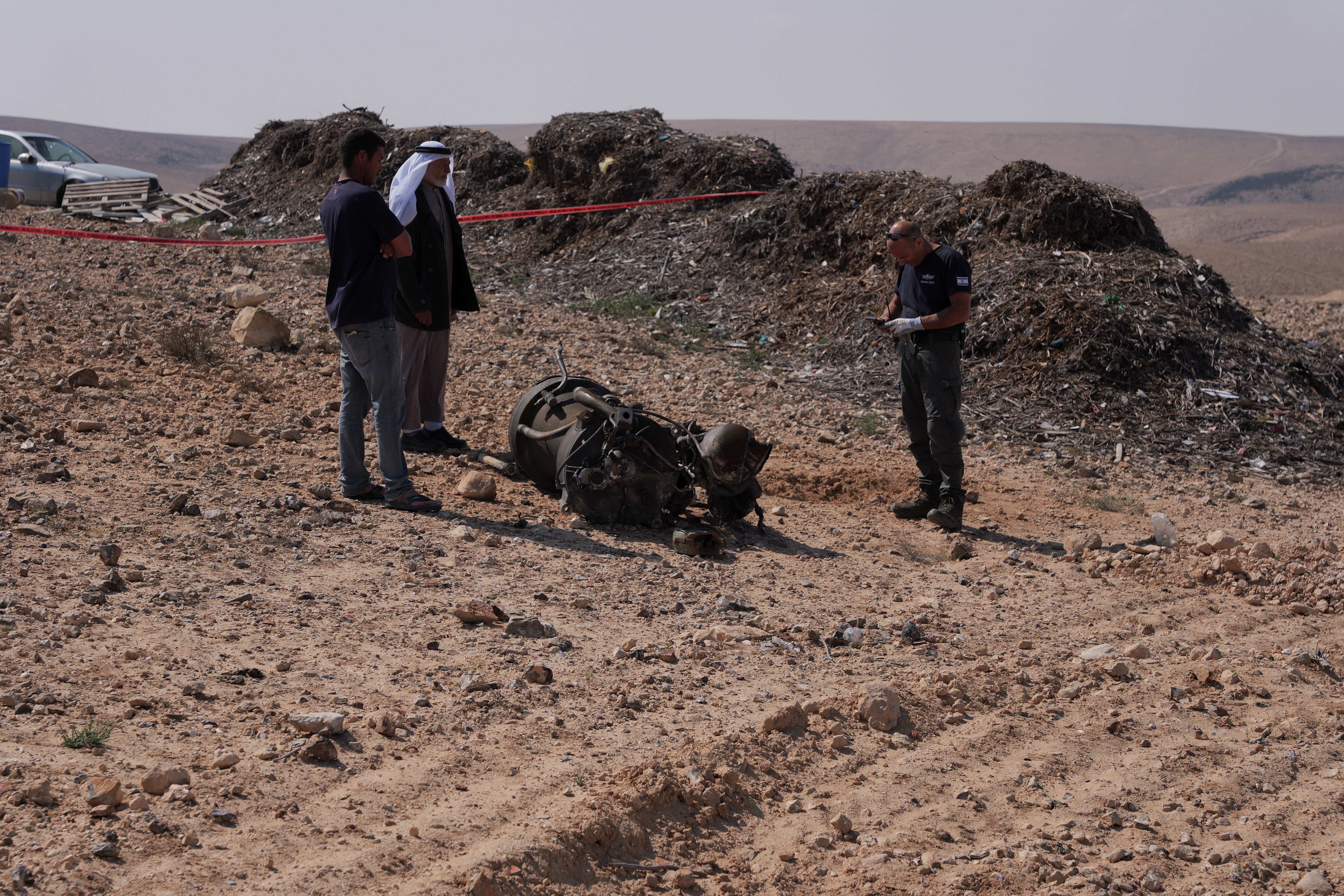
British security firm Ambrey said on Sunday that Israel Defence Forces (IDF) intercepted an Unmanned Aerial Vehicle (UAV) near Eilat, stating that it assessed the UAV was launched from Yemen.

World Chevron
An earthquake of 6.2 magnitude struck the New Britain Region in Papua New Guinea, on Monday, the German Research Center for Geosciences (GFZ)) said.
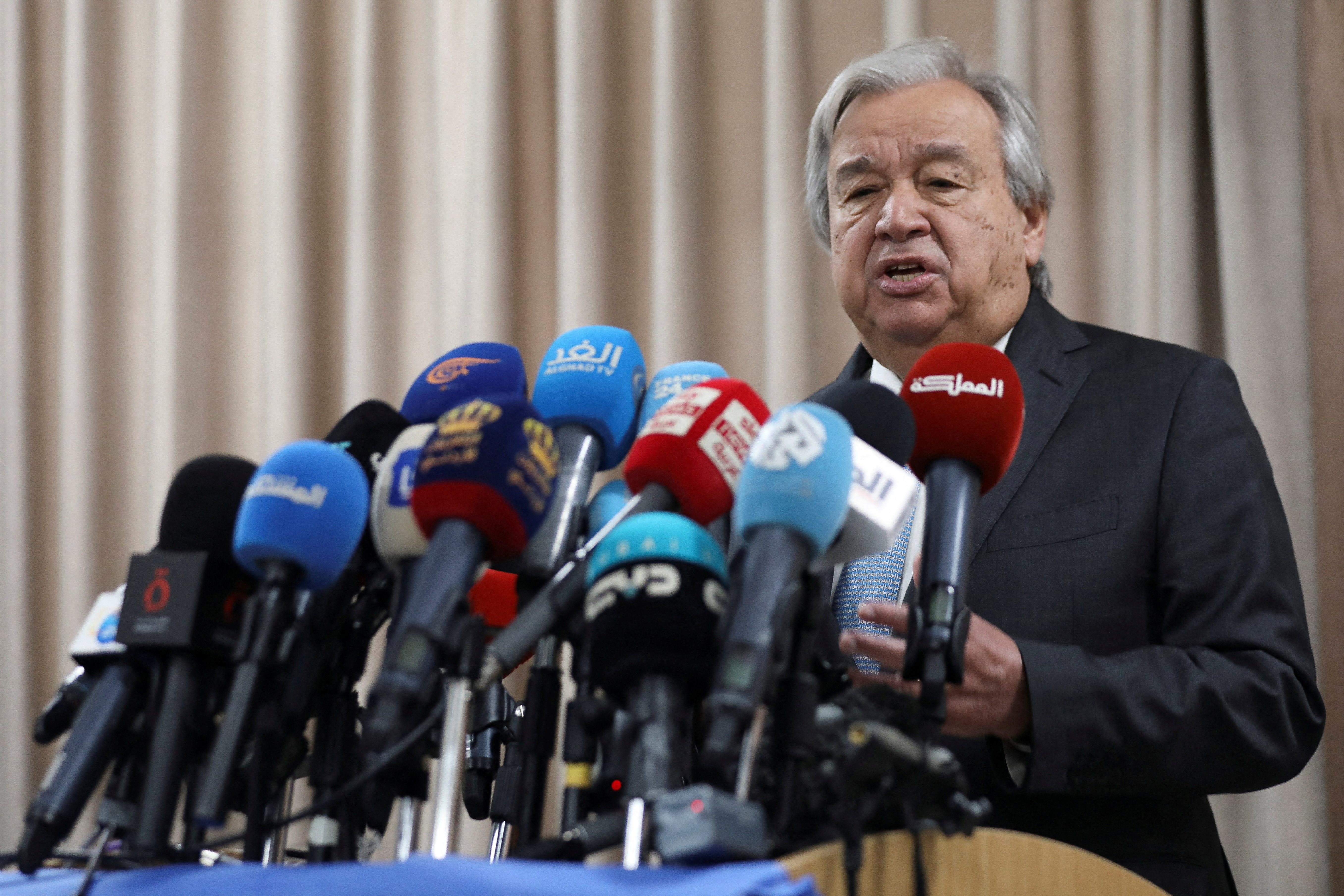
An Australian court will rule on Monday in a defamation suit brought by a former government adviser accused of raping a colleague on the grounds of parliament, in a case that has gripped the nation.
Fragments from a downed Russia missile fell on a settlement outside the central Ukrainian city of Dnipro on Sunday, injuring 12 people, the regional governor said.
- Skip to main content
- Keyboard shortcuts for audio player
James and Jennifer Crumbley, a school shooter's parents, are sentenced to 10-15 years
Quinn Klinefelter

(From left) James Crumbley, his attorney Mariell Lehman, Jennifer Crumbley and her attorney Shannon Smith sit in court in Pontiac, Mich., for Tuesday's sentencing on four counts of involuntary manslaughter for the deaths of four Oxford High School students who were shot and killed by the Crumbleys' son. Bill Pugliano/Getty Images hide caption
(From left) James Crumbley, his attorney Mariell Lehman, Jennifer Crumbley and her attorney Shannon Smith sit in court in Pontiac, Mich., for Tuesday's sentencing on four counts of involuntary manslaughter for the deaths of four Oxford High School students who were shot and killed by the Crumbleys' son.
James and Jennifer Crumbley, whose son murdered four classmates and shot seven other people at Oxford High School in 2021, were each sentenced Tuesday in a Pontiac, Mich. courtroom to between 10 and 15 years in prison.
Both Crumbleys were found guilty in separate trials on four counts of involuntary manslaughter. Each of those charges carried a maximum penalty of 15 years, and the sentences are to be served concurrently.
In court, the Crumbleys looked visibly shaken, breathing heavily as they read from prepared statements prior to learning their fate.
James Crumbley spoke directly to the parents of the students his son had murdered. Several family members attended the sentencing.
"I am sorry for your loss as a result of what my son did," he said. "I cannot express how much I wish that I had known what was going on with him or what was going to happen. Because I absolutely would have done a lot of things differently."

James Crumbley, father of school shooter, found guilty of involuntary manslaughter
In her statement, Jennifer Crumbley said she, her husband and her son, Ethan, were an average family.
"We weren't perfect but we loved our son and each other tremendously," Crumbley said. "This could be any parent up here in my shoes. Ethan could be your child, could be your grandchild, your niece, your nephew, your brother, your sister. Your child could make the fatal decision not just with a gun but a knife, a vehicle, intentionally or unintentionally."
The teenagers who lost their lives during the shooting rampage were Justin Shilling and Madisyn Baldwin, both 17, Tate Myre, 16, and 14-year-old Hana St. Juliana. Six other students and a teacher were injured.
When it was time for their families to speak, several members described how the murders still haunted them.
Nicole Beausoleil, whose daughter Madisyn Baldwin was shot at point blank range, told the Crumbleys buying their son a gun when he was already spiraling into despair made them just as responsible as the shooter.
"Not only did your son kill my daughter but you both did as well. The words 'involuntary' should not be a part of your offense. Everything you did that day, months prior and days after were voluntary acts (helping) your son to commit a murder. Not just one, but multiple," Beausoleil said.
A rare prosecution
The Crumbleys are believed to be the first parents of a mass school shooter to have been charged and convicted of such crimes. Many legal experts say it could set a precedent for charging parents with serious crimes because of actions taken by their child.
Their son, Ethan Crumbley, pleaded guilty to murder and previously was sentenced to life without parole for the school shooting he carried out when he was 15.
Prosecutors never claimed the parents knew about their son's plans to go on a killing spree at Michigan's Oxford High School. However, they argued the Crumbleys ignored signs their son was seriously troubled and bought him a powerful Sig Sauer 9mm handgun as an early Christmas present.
They never told counselors about the gun they gifted their child when they were called to a meeting at the school the day of the shooting, not even when they were shown drawings the teen made. The images featured a pistol resembling the Sig Sauer alongside a figure with bullet wounds and phrases like "blood everywhere" and "help me, the thoughts won't stop."

Jennifer Crumbley convicted of involuntary manslaughter over son's school shooting
Instead, the Crumbleys left their son at school and returned to work. A few hours later, Ethan emerged from a school bathroom with the gun and began firing his first of 32 shots.
Prosecutors told the jury if the Crumbleys had taken a "tragically few steps," four Oxford students would likely still be alive.
They showed evidence that the murder weapon was never properly secured away from their troubled son.
In court, Oakland County Prosecutor Karen McDonald used the murder weapon to demonstrate how to use a cable lock to keep the gun from being fired.
The process took about 10 seconds.
A 'chilling' lack of remorse
The prosecution had asked for the Crumbleys to serve 10 to 15 years in prison, citing what they called a "chilling lack of remorse" on the part of both parents after the shooting.
Prosecutors noted that Jennifer Crumbley testified during her trial that "I've asked myself if I would've done anything differently. And I wouldn't have."
And they pointed to repeated profanity-laced threats James Crumbley made against Oakland County Prosecutor Karen McDonald on jailhouse phone calls he knew were being recorded, as well as in an electronic message.
'Mistakes any parent could make'
James Crumbley's attorney countered that his client had not physically threatened the prosecutor, he merely "vented" his anger over what he saw as an unjust incarceration.
The Crumbleys said they, too, were victims of their son, who they claimed had "manipulated" them into the purchase of a gun they had no idea he would use to kill.
They argued they made "mistakes any parent could make," given the information they had.
Defense attorneys for the couple noted an Oxford High counselor determined Ethan could remain in school the day of the shooting because he did not seem to pose a danger to himself or anyone else.
The couple maintained they thought their son was a normal teenager simply depressed over the loss of his grandmother, a pet dog and a friend who had moved away.
In a pre-sentencing interview with state officials, Jennifer Crumbley said that with the benefit of hindsight, "There are so many things I would change if I could go back in time."
Defense claims extra prison time unnecessary
The Crumbleys had asked to be sentenced to time served.
Defense attorneys argued the parents had already spent more than two and a half years in prison locked in a cell for 23 hours a day, and that further prison time was not necessary because the Crumbleys were not a threat to the public.
Defense attorney Shannon Smith also said more time would not deter others from committing a similar offense because "there is no person who would want the events of Nov. 30, 2021, to repeat themselves."
Smith added that, far from being the uncaring, remorseless mother prosecutors had portrayed to the public and the media, Jennifer Crumbley was focused on her son and distraught over the devastation her son caused.
In a sentencing memo, Jennifer Crumbley's parents and others pleaded with the court for leniency. A young woman, who said she was 18 when she became Crumbley's cellmate for a year and a half, also wrote to the judge.
She said Crumbley had greeted her with a basket of snacks and served as a mother figure to her.
The woman also wrote that inmates screamed threats at Crumbley, who tearfully told them she was sorry and "wished she could change everything her son had done."
Though Judge Cheryl Matthews sentenced the Crumbleys to the stiffest penalty possible, she said that the sentences were not designed to send a message to other parents or prosecutors that they should hold families responsible for children's crimes.
"These convictions are not about poor parenting. These convictions confirm repeated acts, or lack of acts, that could have halted an oncoming runaway train. About repeatedly ignoring things that would make a reasonable person feel the hair on the back of their neck stand up," Matthews said.
Moments after they were sentenced, the Crumbleys began filling out paperwork in the courtroom for an appeal.
Their son, Ethan, who pleaded guilty in October 2022 to murder and terrorism charges, is also likely to appeal his sentence of life without the possibility of parole.
- James Crumbley
- jennifer crumbley
- Ethan Crumbley
- oxford high school

Turn Your Curiosity Into Discovery
Latest facts.

Follistatin344 Peptide Considerations

Approach for Using 5 Tips To Help You Write Your Dissertation
40 facts about elektrostal.
Written by Lanette Mayes
Modified & Updated: 02 Mar 2024
Reviewed by Jessica Corbett

Elektrostal is a vibrant city located in the Moscow Oblast region of Russia. With a rich history, stunning architecture, and a thriving community, Elektrostal is a city that has much to offer. Whether you are a history buff, nature enthusiast, or simply curious about different cultures, Elektrostal is sure to captivate you.
This article will provide you with 40 fascinating facts about Elektrostal, giving you a better understanding of why this city is worth exploring. From its origins as an industrial hub to its modern-day charm, we will delve into the various aspects that make Elektrostal a unique and must-visit destination.
So, join us as we uncover the hidden treasures of Elektrostal and discover what makes this city a true gem in the heart of Russia.
Key Takeaways:
- Elektrostal, known as the “Motor City of Russia,” is a vibrant and growing city with a rich industrial history, offering diverse cultural experiences and a strong commitment to environmental sustainability.
- With its convenient location near Moscow, Elektrostal provides a picturesque landscape, vibrant nightlife, and a range of recreational activities, making it an ideal destination for residents and visitors alike.
Known as the “Motor City of Russia.”
Elektrostal, a city located in the Moscow Oblast region of Russia, earned the nickname “Motor City” due to its significant involvement in the automotive industry.
Home to the Elektrostal Metallurgical Plant.
Elektrostal is renowned for its metallurgical plant, which has been producing high-quality steel and alloys since its establishment in 1916.
Boasts a rich industrial heritage.
Elektrostal has a long history of industrial development, contributing to the growth and progress of the region.
Founded in 1916.
The city of Elektrostal was founded in 1916 as a result of the construction of the Elektrostal Metallurgical Plant.
Located approximately 50 kilometers east of Moscow.
Elektrostal is situated in close proximity to the Russian capital, making it easily accessible for both residents and visitors.
Known for its vibrant cultural scene.
Elektrostal is home to several cultural institutions, including museums, theaters, and art galleries that showcase the city’s rich artistic heritage.
A popular destination for nature lovers.
Surrounded by picturesque landscapes and forests, Elektrostal offers ample opportunities for outdoor activities such as hiking, camping, and birdwatching.
Hosts the annual Elektrostal City Day celebrations.
Every year, Elektrostal organizes festive events and activities to celebrate its founding, bringing together residents and visitors in a spirit of unity and joy.
Has a population of approximately 160,000 people.
Elektrostal is home to a diverse and vibrant community of around 160,000 residents, contributing to its dynamic atmosphere.
Boasts excellent education facilities.
The city is known for its well-established educational institutions, providing quality education to students of all ages.
A center for scientific research and innovation.
Elektrostal serves as an important hub for scientific research, particularly in the fields of metallurgy, materials science, and engineering.
Surrounded by picturesque lakes.
The city is blessed with numerous beautiful lakes, offering scenic views and recreational opportunities for locals and visitors alike.
Well-connected transportation system.
Elektrostal benefits from an efficient transportation network, including highways, railways, and public transportation options, ensuring convenient travel within and beyond the city.
Famous for its traditional Russian cuisine.
Food enthusiasts can indulge in authentic Russian dishes at numerous restaurants and cafes scattered throughout Elektrostal.
Home to notable architectural landmarks.
Elektrostal boasts impressive architecture, including the Church of the Transfiguration of the Lord and the Elektrostal Palace of Culture.
Offers a wide range of recreational facilities.
Residents and visitors can enjoy various recreational activities, such as sports complexes, swimming pools, and fitness centers, enhancing the overall quality of life.
Provides a high standard of healthcare.
Elektrostal is equipped with modern medical facilities, ensuring residents have access to quality healthcare services.
Home to the Elektrostal History Museum.
The Elektrostal History Museum showcases the city’s fascinating past through exhibitions and displays.
A hub for sports enthusiasts.
Elektrostal is passionate about sports, with numerous stadiums, arenas, and sports clubs offering opportunities for athletes and spectators.
Celebrates diverse cultural festivals.
Throughout the year, Elektrostal hosts a variety of cultural festivals, celebrating different ethnicities, traditions, and art forms.
Electric power played a significant role in its early development.
Elektrostal owes its name and initial growth to the establishment of electric power stations and the utilization of electricity in the industrial sector.
Boasts a thriving economy.
The city’s strong industrial base, coupled with its strategic location near Moscow, has contributed to Elektrostal’s prosperous economic status.
Houses the Elektrostal Drama Theater.
The Elektrostal Drama Theater is a cultural centerpiece, attracting theater enthusiasts from far and wide.
Popular destination for winter sports.
Elektrostal’s proximity to ski resorts and winter sport facilities makes it a favorite destination for skiing, snowboarding, and other winter activities.
Promotes environmental sustainability.
Elektrostal prioritizes environmental protection and sustainability, implementing initiatives to reduce pollution and preserve natural resources.
Home to renowned educational institutions.
Elektrostal is known for its prestigious schools and universities, offering a wide range of academic programs to students.
Committed to cultural preservation.
The city values its cultural heritage and takes active steps to preserve and promote traditional customs, crafts, and arts.
Hosts an annual International Film Festival.
The Elektrostal International Film Festival attracts filmmakers and cinema enthusiasts from around the world, showcasing a diverse range of films.
Encourages entrepreneurship and innovation.
Elektrostal supports aspiring entrepreneurs and fosters a culture of innovation, providing opportunities for startups and business development.
Offers a range of housing options.
Elektrostal provides diverse housing options, including apartments, houses, and residential complexes, catering to different lifestyles and budgets.
Home to notable sports teams.
Elektrostal is proud of its sports legacy, with several successful sports teams competing at regional and national levels.
Boasts a vibrant nightlife scene.
Residents and visitors can enjoy a lively nightlife in Elektrostal, with numerous bars, clubs, and entertainment venues.
Promotes cultural exchange and international relations.
Elektrostal actively engages in international partnerships, cultural exchanges, and diplomatic collaborations to foster global connections.
Surrounded by beautiful nature reserves.
Nearby nature reserves, such as the Barybino Forest and Luchinskoye Lake, offer opportunities for nature enthusiasts to explore and appreciate the region’s biodiversity.
Commemorates historical events.
The city pays tribute to significant historical events through memorials, monuments, and exhibitions, ensuring the preservation of collective memory.
Promotes sports and youth development.
Elektrostal invests in sports infrastructure and programs to encourage youth participation, health, and physical fitness.
Hosts annual cultural and artistic festivals.
Throughout the year, Elektrostal celebrates its cultural diversity through festivals dedicated to music, dance, art, and theater.
Provides a picturesque landscape for photography enthusiasts.
The city’s scenic beauty, architectural landmarks, and natural surroundings make it a paradise for photographers.
Connects to Moscow via a direct train line.
The convenient train connection between Elektrostal and Moscow makes commuting between the two cities effortless.
A city with a bright future.
Elektrostal continues to grow and develop, aiming to become a model city in terms of infrastructure, sustainability, and quality of life for its residents.
In conclusion, Elektrostal is a fascinating city with a rich history and a vibrant present. From its origins as a center of steel production to its modern-day status as a hub for education and industry, Elektrostal has plenty to offer both residents and visitors. With its beautiful parks, cultural attractions, and proximity to Moscow, there is no shortage of things to see and do in this dynamic city. Whether you’re interested in exploring its historical landmarks, enjoying outdoor activities, or immersing yourself in the local culture, Elektrostal has something for everyone. So, next time you find yourself in the Moscow region, don’t miss the opportunity to discover the hidden gems of Elektrostal.
Q: What is the population of Elektrostal?
A: As of the latest data, the population of Elektrostal is approximately XXXX.
Q: How far is Elektrostal from Moscow?
A: Elektrostal is located approximately XX kilometers away from Moscow.
Q: Are there any famous landmarks in Elektrostal?
A: Yes, Elektrostal is home to several notable landmarks, including XXXX and XXXX.
Q: What industries are prominent in Elektrostal?
A: Elektrostal is known for its steel production industry and is also a center for engineering and manufacturing.
Q: Are there any universities or educational institutions in Elektrostal?
A: Yes, Elektrostal is home to XXXX University and several other educational institutions.
Q: What are some popular outdoor activities in Elektrostal?
A: Elektrostal offers several outdoor activities, such as hiking, cycling, and picnicking in its beautiful parks.
Q: Is Elektrostal well-connected in terms of transportation?
A: Yes, Elektrostal has good transportation links, including trains and buses, making it easily accessible from nearby cities.
Q: Are there any annual events or festivals in Elektrostal?
A: Yes, Elektrostal hosts various events and festivals throughout the year, including XXXX and XXXX.
Was this page helpful?
Our commitment to delivering trustworthy and engaging content is at the heart of what we do. Each fact on our site is contributed by real users like you, bringing a wealth of diverse insights and information. To ensure the highest standards of accuracy and reliability, our dedicated editors meticulously review each submission. This process guarantees that the facts we share are not only fascinating but also credible. Trust in our commitment to quality and authenticity as you explore and learn with us.
Share this Fact:
Israel Calls off School Trips, Puts Forces on Full Alert Amid Iran Threat

FILE PHOTO: An ambulance is parked outside the Iranian embassy after a suspected Israeli strike on Monday on Iran's consulate, adjacent to the main Iranian embassy building, which Iran said had killed seven military personnel including two key figures in the Quds Force, in the Syrian capital Damascus, Syria April 2, 2024. REUTERS/Firas Makdesi/File Photo
JERUSALEM (Reuters) - Israel called off on Saturday school trips and other youth activities planned for the coming days, the beginning of the Passover festival, and placed the armed forces on full alert due to a possible attack by Iran.
Announcing the measures in a televised briefing, chief military spokesperson Rear Admiral Daniel Hagari said dozens of combat planes were airborne as part of the state of readiness.
War in Israel and Gaza

(Writing by Dan Williams)
Copyright 2024 Thomson Reuters .
Photos You Should See - April 2024

Join the Conversation
Tags: Iran , Yemen , Lebanon , Africa , United States , Israel , Syria , Iraq , Asia , Middle East , Egypt
America 2024

Health News Bulletin
Stay informed on the latest news on health and COVID-19 from the editors at U.S. News & World Report.
Sign in to manage your newsletters »
Sign up to receive the latest updates from U.S News & World Report and our trusted partners and sponsors. By clicking submit, you are agreeing to our Terms and Conditions & Privacy Policy .
You May Also Like
The 10 worst presidents.
U.S. News Staff Feb. 23, 2024

Cartoons on President Donald Trump
Feb. 1, 2017, at 1:24 p.m.

Photos: Obama Behind the Scenes
April 8, 2022

Photos: Who Supports Joe Biden?
March 11, 2020

Trump Gives Johnson Vote of Confidence
Aneeta Mathur-Ashton April 12, 2024

U.S.: Threat From Iran ‘Very Credible’
Cecelia Smith-Schoenwalder April 12, 2024

Inflation Up, Consumer Sentiment Steady
Tim Smart April 12, 2024

House GOP Hands Johnson a Win

A Watershed Moment for America
Lauren Camera April 12, 2024

The Politically Charged Issue of EVs

Museum and Exhibition Center

Most Recent: Reviews ordered by most recent publish date in descending order.
Detailed Reviews: Reviews ordered by recency and descriptiveness of user-identified themes such as wait time, length of visit, general tips, and location information.

Museum and Exhibition Center - All You Need to Know BEFORE You Go (2024)
- (0.03 mi) Elektrostal Hotel
- (1.15 mi) Yakor Hotel
- (1.42 mi) Mini Hotel Banifatsiy
- (1.65 mi) Apelsin Hotel
- (1.33 mi) Elemash
- (0.20 mi) Prima Bolshogo
- (0.30 mi) Makecoffee
- (0.40 mi) Mazhor
- (0.42 mi) Amsterdam Moments
- (0.42 mi) Pechka
First-year coaches look to continue winning ways in familiar places

Moments after Milton’s 10-2 comeback win over Bay State Conference rival Wellesley Monday afternoon, a roar went up from the Wildcats’ huddle in shallow left field.
Not only was it their first win of the year, and a resilient one at that, it was the first victory for first-year coach Greg Lannon .
Lannon is one of three new coaches for teams coming off deep runs in the state tournament — along with Casey Cummins at St. John’s (Shrewsbury) and Jon Dunn at Medfield. All three are at their alma maters.
After stepping in for Brendan Morrissey (who departed for Milton Academy), Lannon is tasked with continuing the recent success at 11th-ranked Milton (2-1), punctuated by back-to-back Division 2 titles . Fortunately, he was on the bench for both those runs.
Advertisement
“I learned so much in all my years here, but especially the last two,” Lannon said. “How to handle the team and handle pressure situations, and I think that’s helped me immensely.
As the junior varsity coach and a varsity assistant the past five years, Lannon knows his relationships with the players will show through since he’s worked with most of the roster. The Wildcats return key juniors Scott Longo , who has committed to Northeastern, and Harry Hinckle .
“It wasn’t a seamless transition per se: it’s a different voice, but I think having some continuity for them really helped,” Lannon said.
In the opposing dugout Monday was Wellesley first-year coach Ted Novio , stepping in following the departure of longtime coach Rob Kane . He is well versed in the Bay State Conference after starring at Braintree (and later the University of Maine).
At No. 4 St. John’s (2-1), Cummins took over for longtime coach Charlie Eppinger , who retired. It’s a full-circle moment for the former Pioneer — after graduating St. John’s in 2008, he joined Eppinger’s staff as an assistant. After not making the varsity team at Merrimack, Eppinger was his first call.
“I knew my playing career at some point, whenever that would be, would end, and I already had an interest in coaching,” Cummins said. “The day I didn’t make the team at Merrimack, I was like, ‘Alright, now coaching has started.’”
After stops across the state — Nichols College, the Worcester Bravehearts of the Futures League, the Cape Cod Baseball League’s Bourne Braves, and Sutton High last year — Cummins returned to St. John’s hoping to join Eppinger’s staff. Instead, he was handed the keys.
“Coming back to St. John’s was always the goal,” Cummins said. “I’m fortunate enough to have the opportunity and to realize that it doesn’t come around very often. I truly appreciate the tradition of the program and the weight of the job.”
The Pioneers’ strength is in their pitching. Seniors Noah Basgaard (Stonehill) and Brady Shea (Salve Regina) lead the way for a squad hoping to push past the semifinals, where they were stopped last year by Taunton.
At Medfield, where the Warriors have finished as runners-up in Division 3 two of the last three seasons, Dunn takes the reins from Dave Worthley , who retired.
Dunn, who played collegiately at James Madison, graduated from Medfield in 1994. He spent a few years as an assistant after he returned to the school to teach math, but after taking time off to coach his three children through youth baseball, Dunn is back on the field he used to play on.
“Watching the success that they’ve had, I feel honored to continue that path and be a part of future success,” Dunn said. “It means a lot to wear the Medfield hat and be a part of the Warrior baseball program.”
The Warriors (0-2) graduated 10 seniors from a squad that fell to Oakmont in the state final. But Dunn sees promise in the returning core up the middle, anchored by senior Jack Iovino (Merrimack) in center field. They have a young team, but that’s fine with Dunn.
“I’ve been involved in the game at different levels, so being able to use the experiences that I’ve had and work with young kids to teach them some of the things I wish I had known in high school, that’s exciting to me,” Dunn said. “That’s the one thing that drew me back in, was just being able to work with the kids.”

Extra bases
▪ It was a memorable Wednesday afternoon for the Bushley family when BC High and Catholic Memorial met in a Catholic Conference matchup in West Roxbury. BC High senior righthander Charlie Bushley pitched to his younger brother, sophomore catcher Sam Bushley.
But here’s the twist. Adam Bushley, Sam’s twin, plays left field for CM. So on two occasions, Charlie pitched to Sam with Adam at the plate. In the first at-bat, Charlie struck out Adam on three fastballs. But in the second at-bat, Charlie plunked Adam in the head (by accident), which will surely be a topic of discussion at their Cohasset home.
▪ No. 14 Hanover received a pair of standout pitching performances from Owen Kennedy and Gabe Knudsen to open the season. A senior righthander, Kennedy fired a one-hitter with 15 strikeouts in Tuesday’s 4-0 win over Plymouth South before Knudsen, a Globe All-Star last spring as a junior, fanned 14 over six two-hit innings in Wednesday’s 6-1 win over No. 8 Plymouth North . . . Two-time Division 1 runner-up Franklin has lost six regular-season games the last two seasons. The Panthers started 1-2, but got back on track Wednesday with a 6-2 win at top-ranked Taunton. Jake Shaughnessy pitched 6⅔ innings of two-run ball to earn the win and Rex Cinelli slapped two hits and scored a run . . . . Dover-Sherborn’s Brian Olson and Wellesley’s Luke Miele each hit three home runs Wednesday . . . North Andover righthander Cole Mullen threw six no-hit innings Wednesday as the Scarlet Knights topped Westford, 2-0, to grab for a key nonleague win.
Games to watch
Saturday, No. 2 BC High at No. 1 Taunton, 1 p.m . — The top two teams in the Globe’s Top 20 square off for an early-season showdown. Taunton won the last matchup, 3-2, in the D1 quarterfinals in June.
Tuesday and Thursday, Brad Martin Tournamant, 10 a.m. and 1 p.m . — Host Plymouth North and Division 1 contender Bridgewater-Raynham headline the field. They could meet in Thursday’s championship if both survive semifinal matchups against Dartmouth (B-R) and Silver Lake (PN).
Tuesday and Thursday, Sully Tournament, 3 p.m. and 6 p.m. — This tournament at Adams Field in Quincy features Milton, Foxborough, North Quincy, and Quincy. Two-time reigning Division 2 champion Milton won the title last spring.
Wednesday, Catholic Memorial at No. 5 Franklin, 11 a.m . — CM ace Brett Mulligan is one of the state’s top pitchers, and could face Panthers lefty Austin Campbell for a phenomenal pitching duel.
Wednesday, No. 19 Walpole at No. 18 King Philip, 3:45 p.m. — Two of the best teams from the Bay State Conference and Hockomock League meet for an intriguing nonleague tilt.
Correspondent Matt Doherty contributed to this story.

COMMENTS
Learning can take place outside school setting and school trips are often used to complement formal learning in classroom. As a sub type of educational tourism, the trips have been evolved and ...
Educational school trips can enable pupils to extend knowledge learned in the classroom and provide pupils with opportunities to give context to learned material. School trips allow you to personally and physically experience something rather than only being taught or told about a new or unfamiliar concept (Kelly, 2018; Simon, 2010).
A micro field trip to a nearby park or around school grounds, for example, can be a great opportunity to "enhance a unit on nature and wildlife while reinforcing vocabulary for senses, colors, and the concepts of quantity and size," Schwartz writes. "Afterwards, students might write descriptive stories set in the place you visited using ...
Idea 4: Farm Visits. Educational trips for students, especially younger children, demand simplicity and fun learning. They barely understand the history of exploring around the museums. Here, a fun farm visit is both exciting and educational! Farms are perfect for exploring nature closely.
Here's why field trips are important. The study found that regardless of gender, ethnicity or socioeconomic status, children who take school trips have better grades (59%), higher graduation rates from high school (95%) and college (63%) and greater income (12% higher annually). In fact, 89% said educational trips had a positive, lasting ...
Step three - building your itinerary. Now that you've decided what type of school trip you're planning and selected a tour provider, it's time to start building your itinerary! You will need to know your estimated group size, and budget per student. Student Horizons' tours are bespoke and can be entirely customised to meet your needs.
In our recent national study of EE field trips, we examined the relationships between pre-visit preparation, post-visit follow-up and students' learning outcomes related to environmental literacy, positive youth development, and 21st century skills (Lee et al., 2020).We found that higher levels of pre-trip logistical and subject matter-related preparation, including specific lessons ...
El Baggari believes that travel is about more than place. It is about people: the people you see, the people you meet, and the people who change you along the way. "I believe we have the opportunity to learn at every moment from every encounter," says El Baggari. "We're here, and alive!
A substantial body of research on field trips has accumulated over the past 30 years, much of which has attempted to identify whether and to what degree field trips contribute to school-based instruction and learning, the factors that may contribute to such learning, and, to a lesser degree, the kinds of learning outcomes that can result from these experiences.
COVID-19. has affected overnight school trips, and why this matters. Published: May 14, 2021 7:57am EDT. For over 45 years, children from across the UK have headed to the family-run Rhos-Y-Gwaliau ...
Preschool Field Trip Ideas Marc Dufresne via iStock. Early-grade field trips help kids learn about the world and also teach them good field trip behavior. These are our top picks for the pre-K crowd, but many of the options on our kindergarten list are perfect for this age group too. Library: Not every student's parents take them to story time.
School Trip Idea 1: Local Museums. A day spent exploring a local history museum, art museum, science centre, or planetarium can be both educational and fun. Students can learn about different cultures and periods, as well as gain an appreciation for the work of artists and scientists past and present.
Even just from a purely academic point of view, school trips are really important - they give children practical memories and experiences of the subject. And this will be much easier to remember under pressure in the exam hall than any revision notes, flashcards or passages from textbooks could ever be. Plus, as well as making it easier to ...
2-Encouraging and discovering new interests. As humans and students our brain gets excited by different things, topics and teaching methods. School trips can be a powerful motivation tool, encouraging further learning on a particular subject or sparking their interest in new ones. School trips abroad and indeed local school tours can inspire ...
School trips allow for the discovery of new interests. Exposure to new situations, topics, and teaching methods automatically stimulates interest and excites the brain. As such, school trips are a potent tool to cultivate new interests and boost motivation to continue exploring existing ones. School trips abroad and even shorter outings closer ...
Categories for outdoor learning contexts were formed after an initial survey of the dataset, and Table 1 shows that the most common contexts were adventure education (25%), residential camps (22%), curricular lessons conducted in the outdoors (20%) and school gardens (16%). Regular field trips (7%), adventure therapy (3%) and school grounds (2% ...
17. St. John's International School. 18. Sayfol International School. Field trips offer invaluable benefits that extend beyond the confines of the classroom, allowing students to experience hands-on learning, cultural enrichment, social and emotional development, and career exploration. These trips foster a deeper understanding of academic ...
I went on a school trip to (name of the city) of (Governorate name). of (city area in km) and (population number) approximately. I prepared my small bag and put sandwiches, juice and water for the trip. I went to sleep early to wake up early to be full of energy on the journey. We rode the bus in front of the school in the early morning and we ...
The school trip School trip. Join us on a school trip to Cardiff on Saturday 13th May.. We will spend the morning in the city centre.For lunch we'll have a picnic in the park.In the afternoon we will visit the Science and Technology Museum.. Price: £20 Meet in the school car park at 8:00 am.Please arrive on time. We will return to the school at 5:30 pm. ...
April 4, 2024. The music teacher's classes at the strict, no-nonsense reform school in the woods of upstate New York would seem to be a teenager's respite amid all the rules, a place for ...
Israel called off on Saturday school trips and other youth activities planned for the coming days, the beginning of the Passover festival, and placed the armed forces on full alert due to a ...
Bill Pugliano/Getty Images. James and Jennifer Crumbley, whose son murdered four classmates and shot seven other people at Oxford High School in 2021, were each sentenced Tuesday in a Pontiac ...
40 Facts About Elektrostal. Elektrostal is a vibrant city located in the Moscow Oblast region of Russia. With a rich history, stunning architecture, and a thriving community, Elektrostal is a city that has much to offer. Whether you are a history buff, nature enthusiast, or simply curious about different cultures, Elektrostal is sure to ...
Max Johnson, half-brother of former British prime minister Boris Johnson, talks about his UK childhood, Covid-19 frustrations, being a banker in Hong Kong, and a special trip through mainland China.
JERUSALEM (Reuters) - Israel called off on Saturday school trips and other youth activities planned for the coming days, the beginning of the Passover festival, and placed the armed forces on full ...
Elektrostal, city, Moscow oblast (province), western Russia.It lies 36 miles (58 km) east of Moscow city. The name, meaning "electric steel," derives from the high-quality-steel industry established there soon after the October Revolution in 1917. During World War II, parts of the heavy-machine-building industry were relocated there from Ukraine, and Elektrostal is now a centre for the ...
Speciality Museums. Write a review. Be the first to upload a photo. Upload a photo. Suggest edits to improve what we show. Improve this listing. The area. Raskovoi ul., d. 37, Elektrostal 144003 Russia. Reach out directly.
First-year coaches look to continue winning ways in familiar places. Milton first-year head coach Greg Lannon offered a few high fives Monday as the Wildcats roared back for a 10-2 win over ...